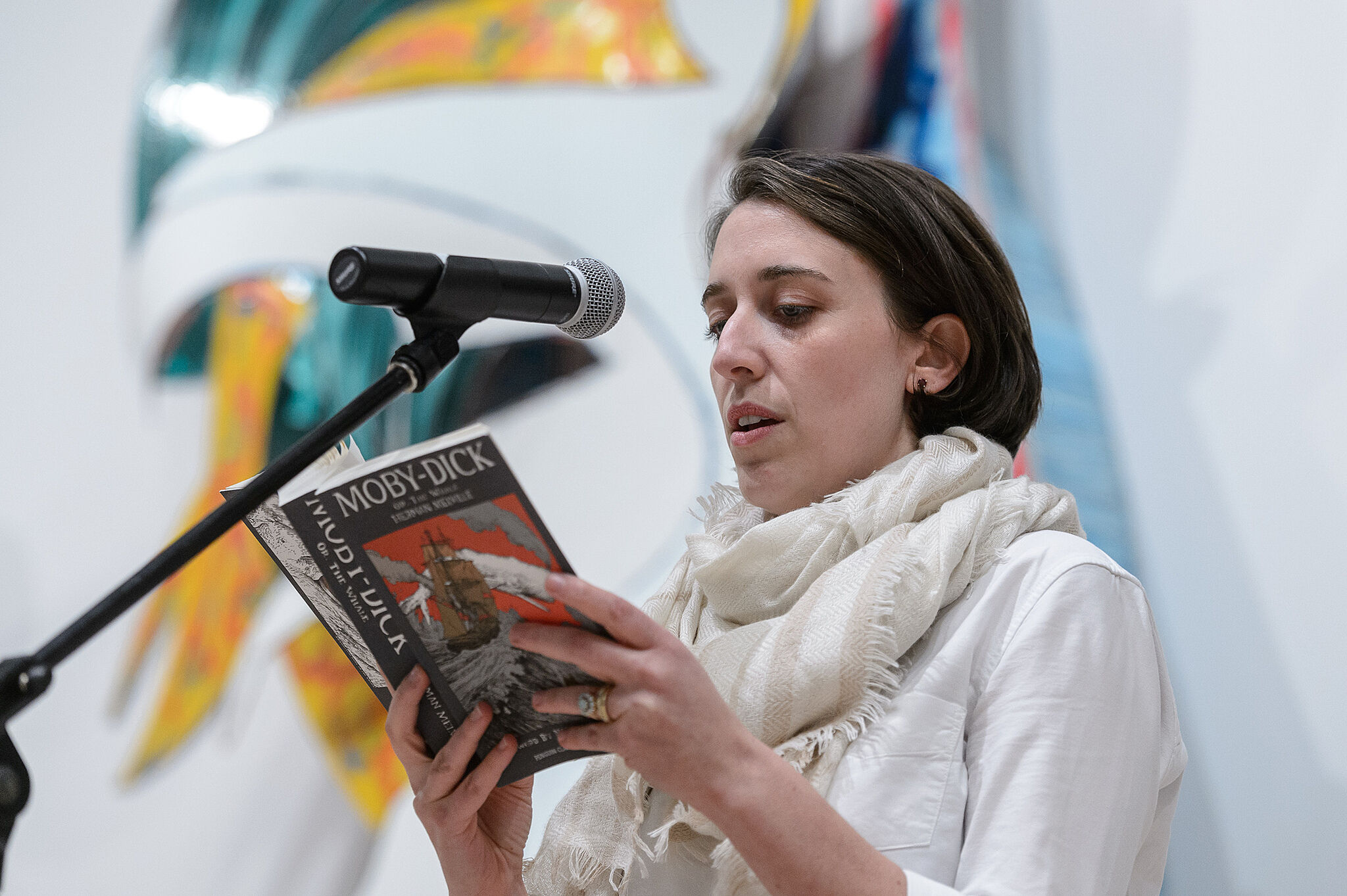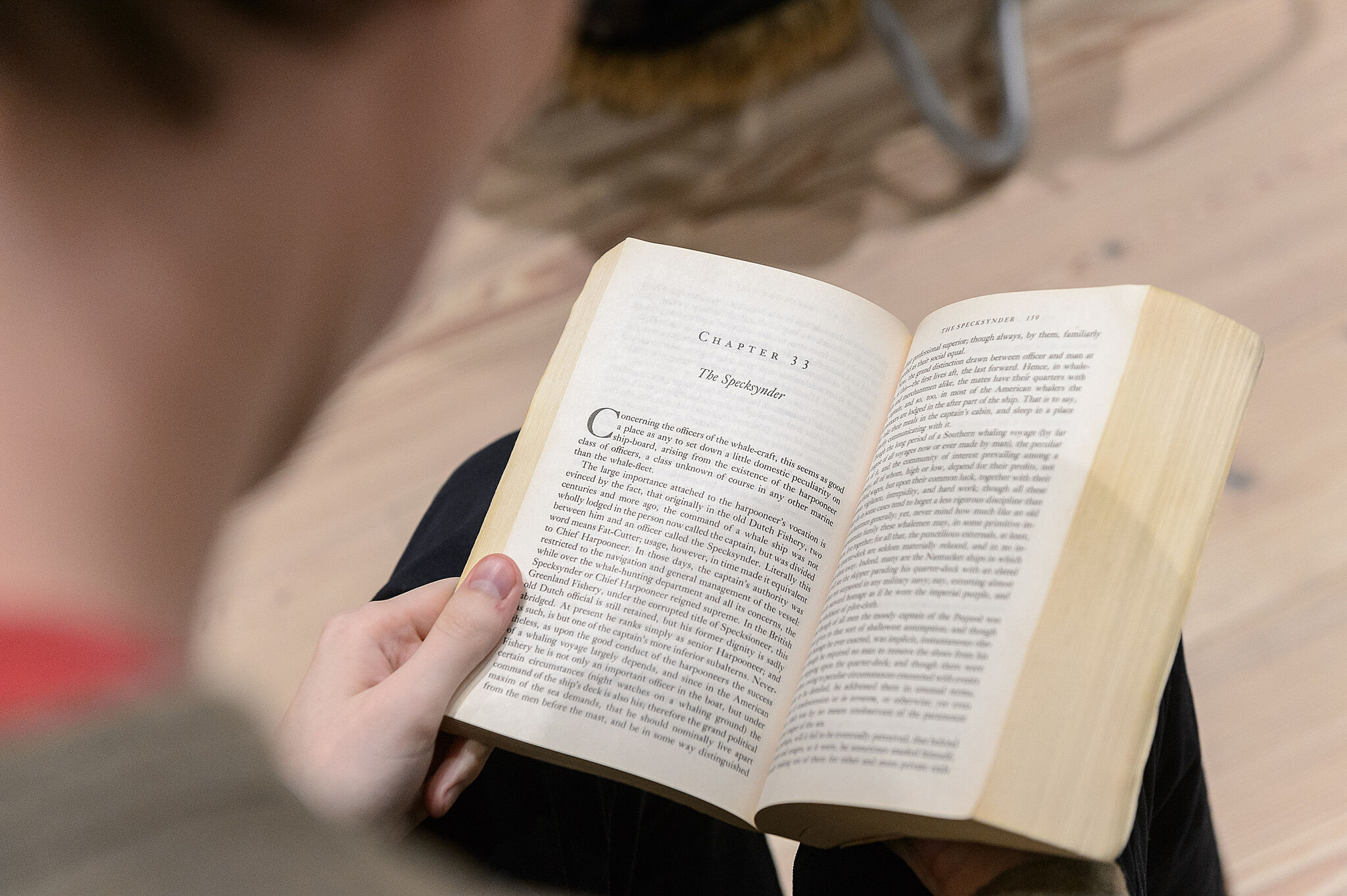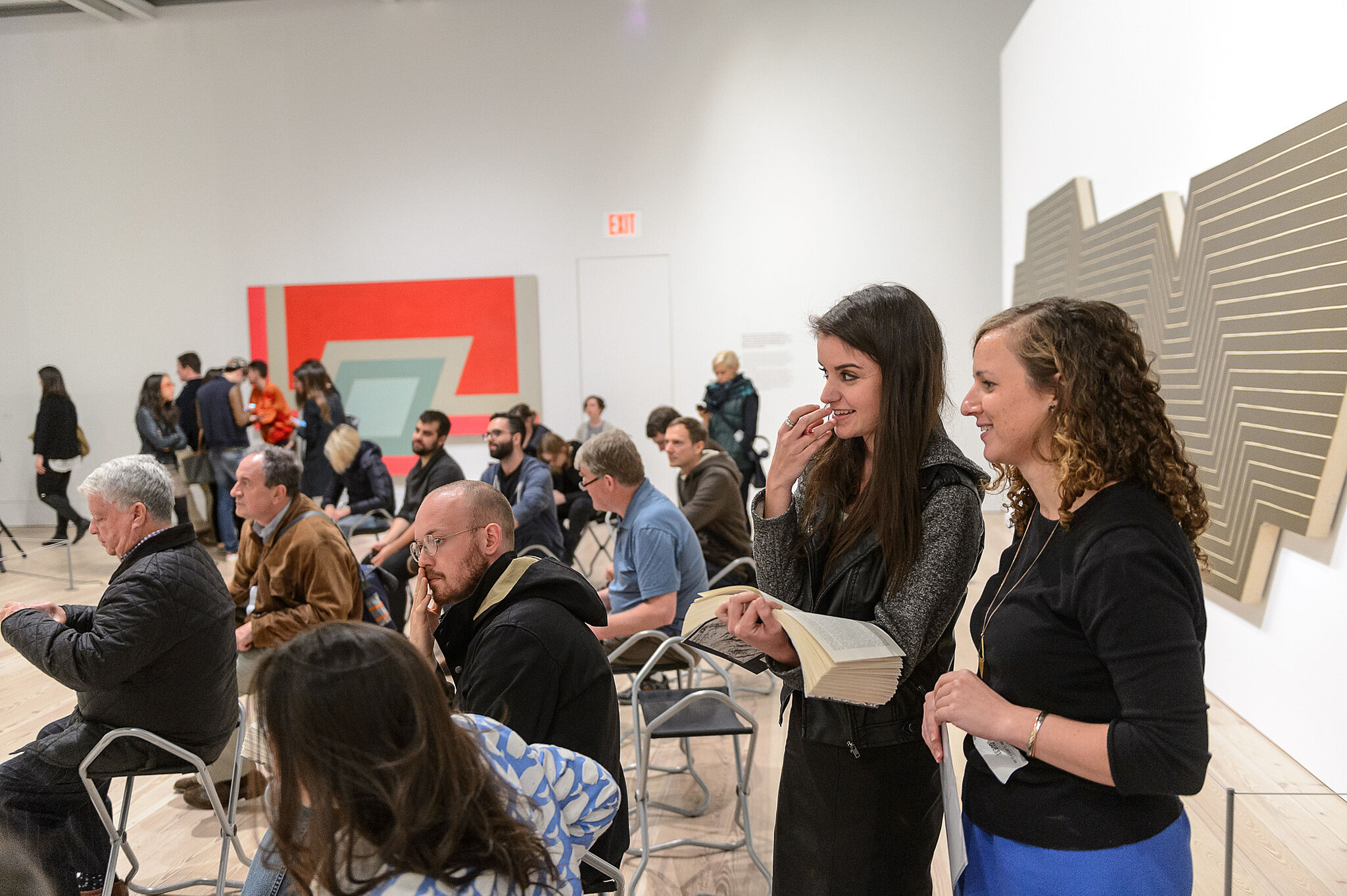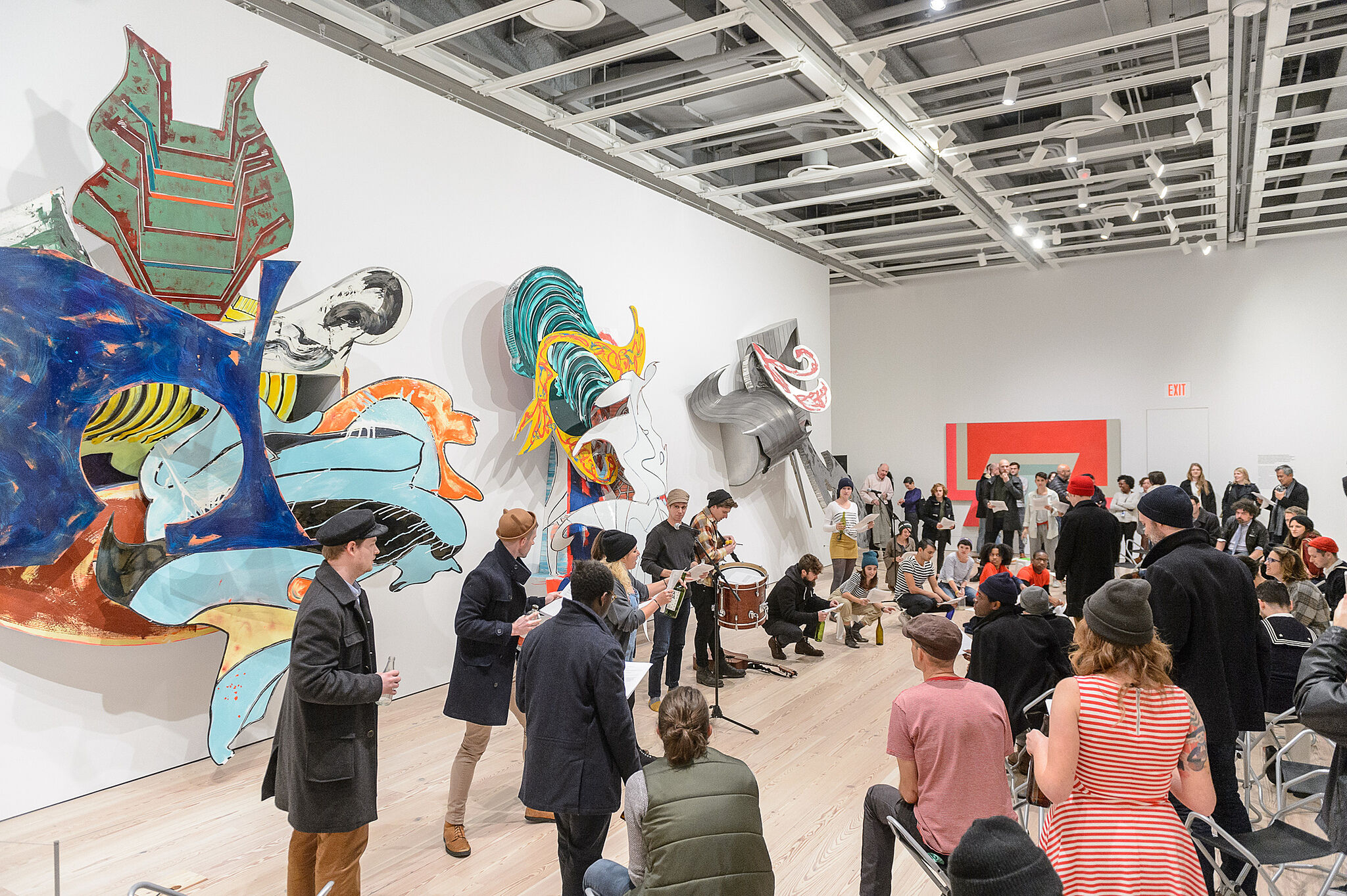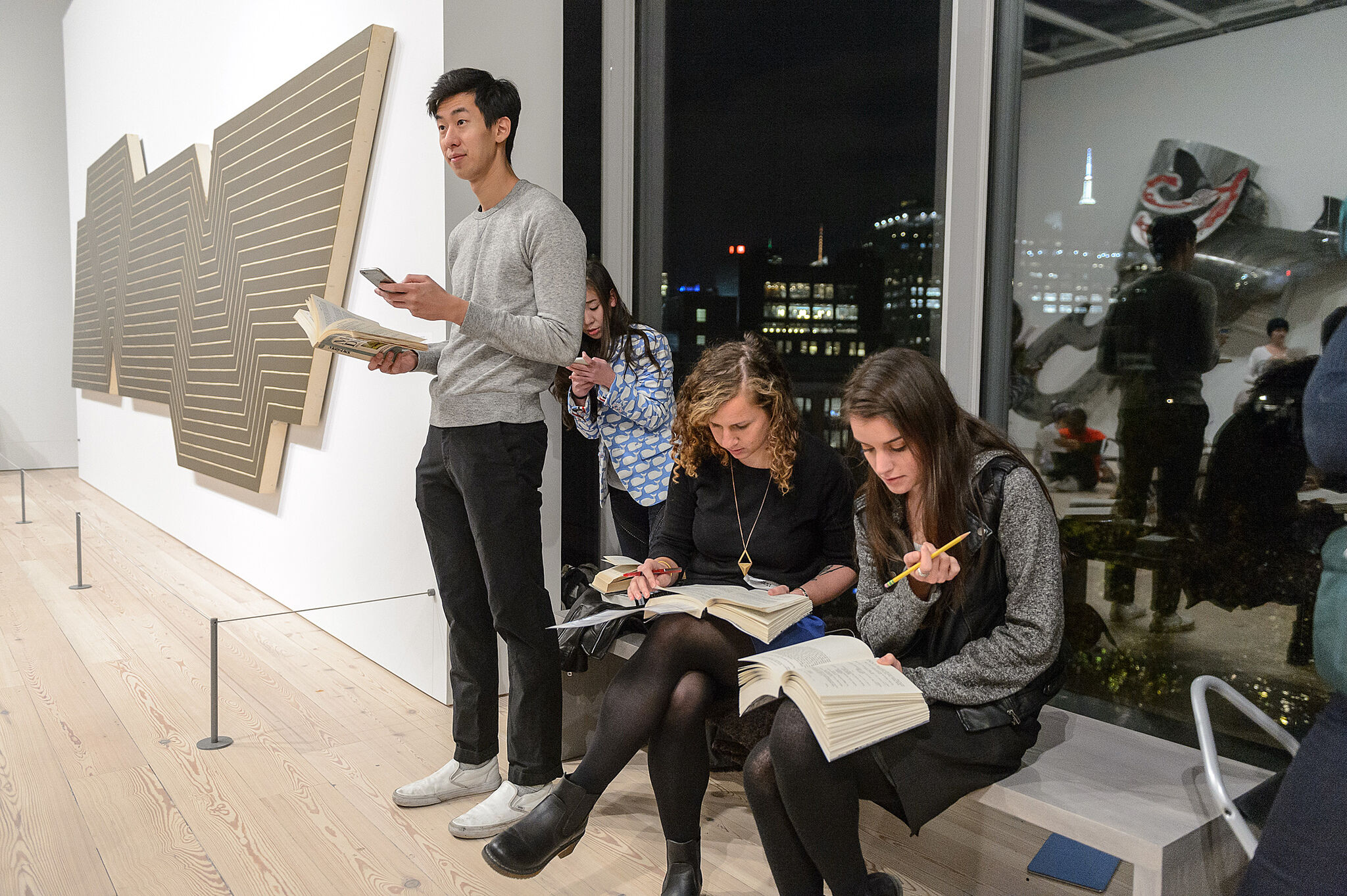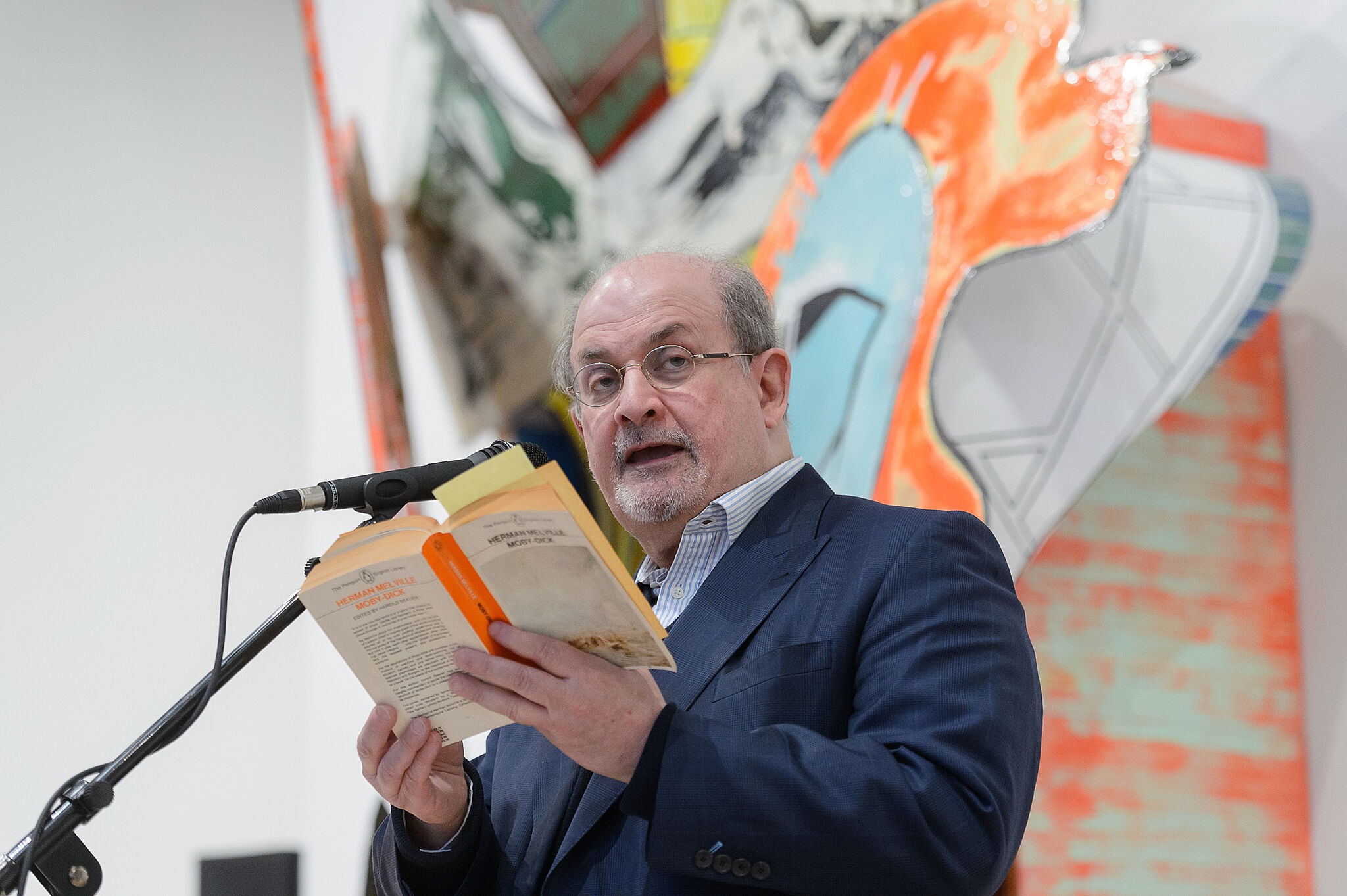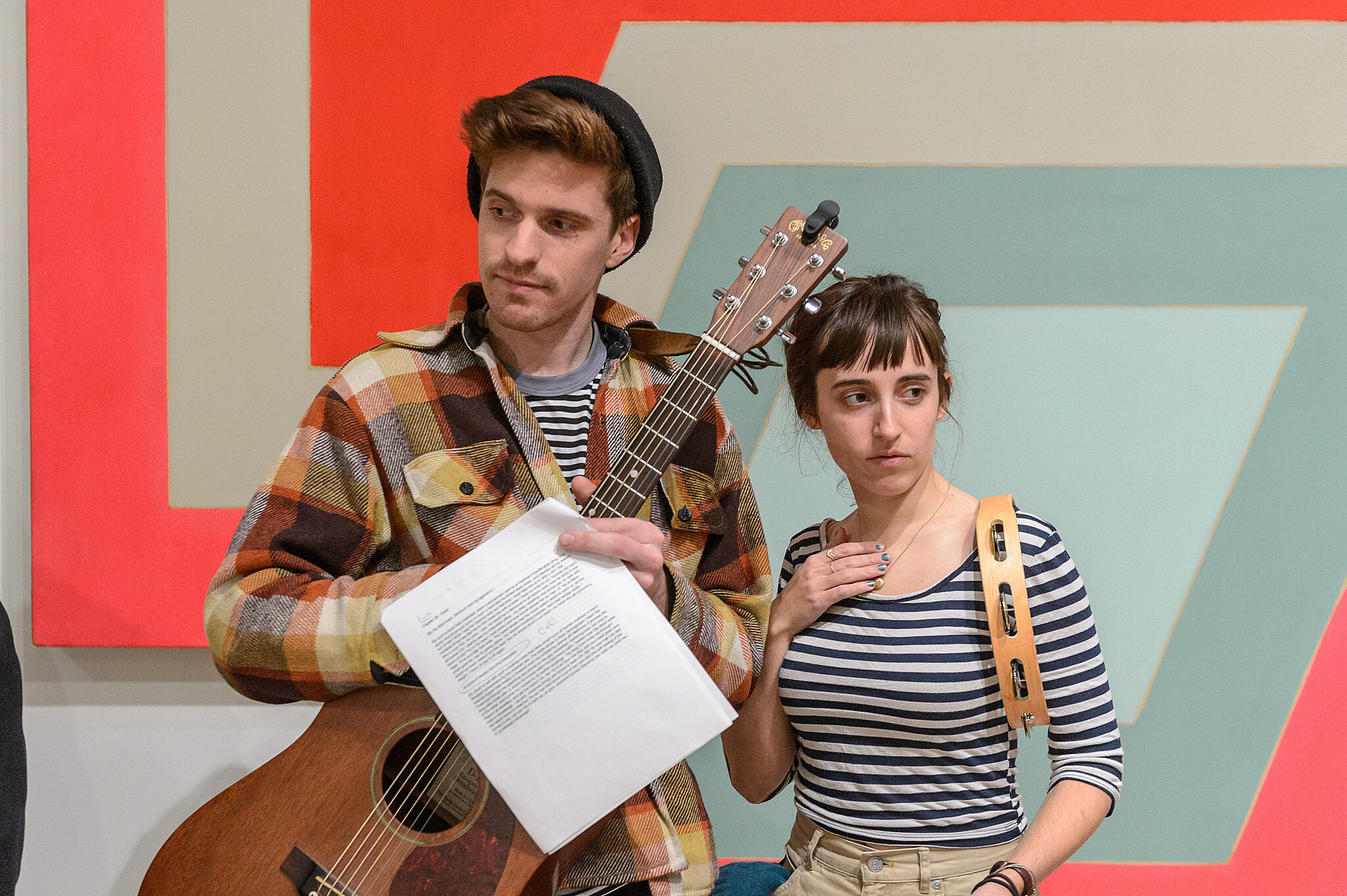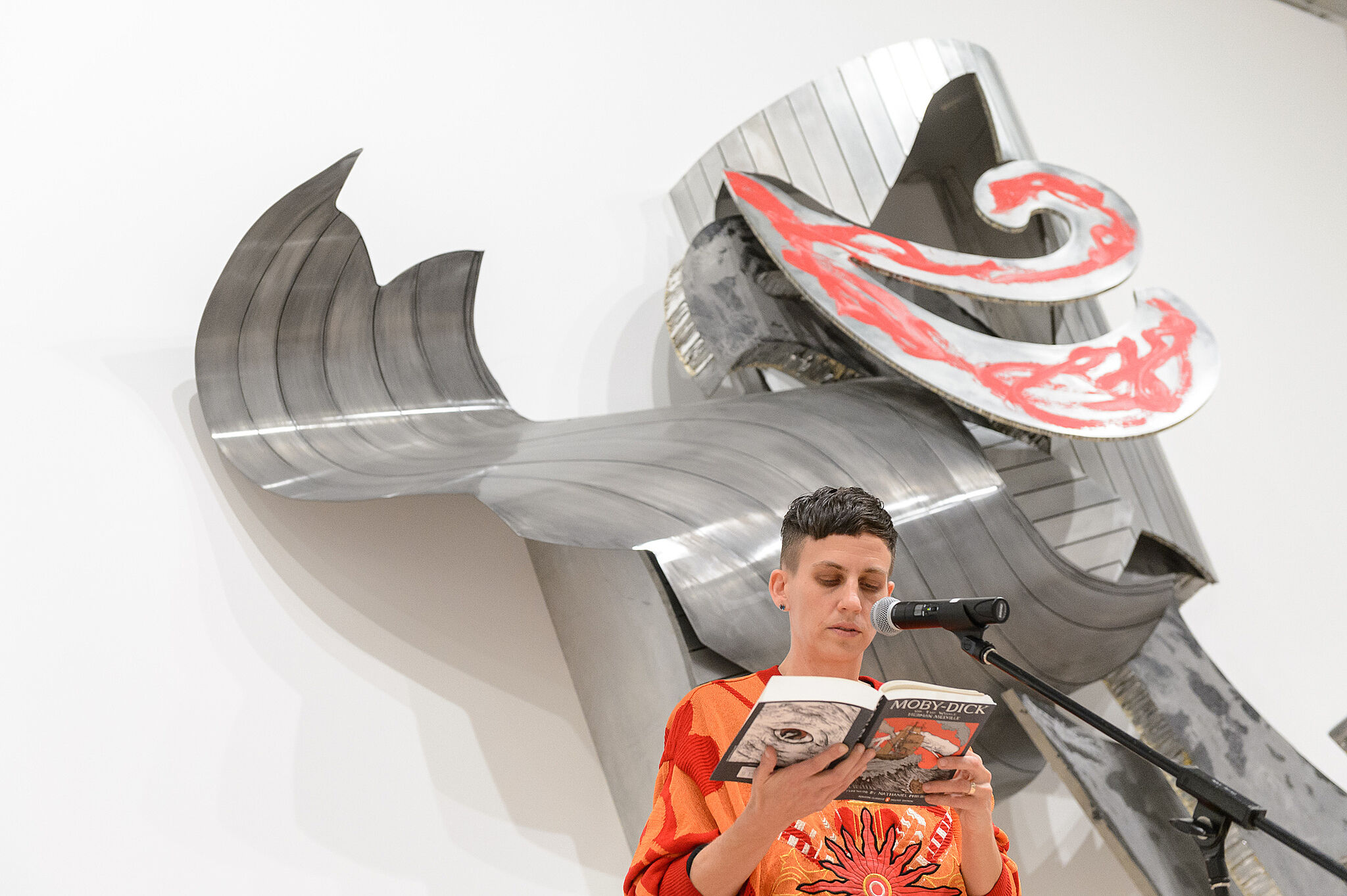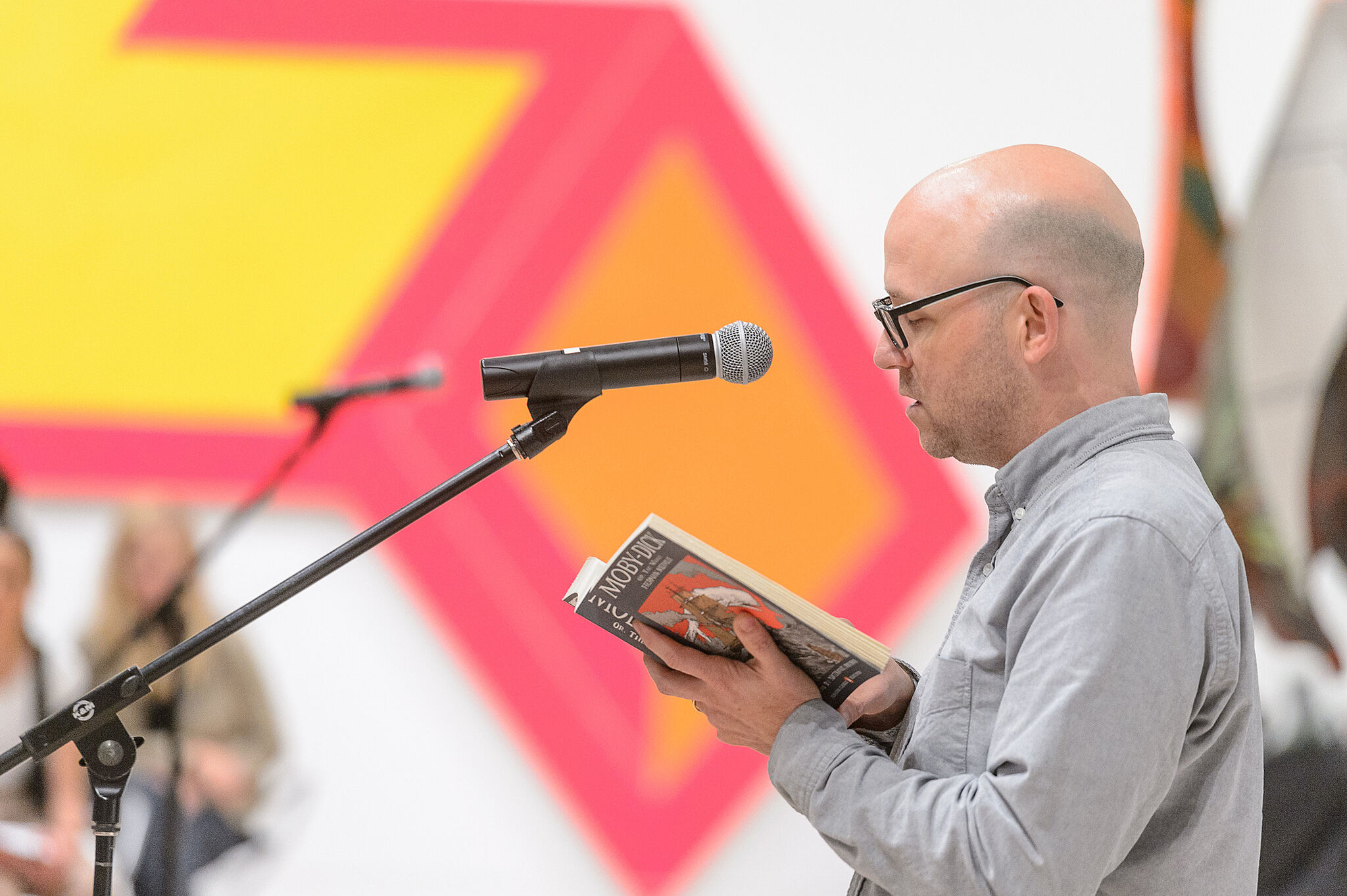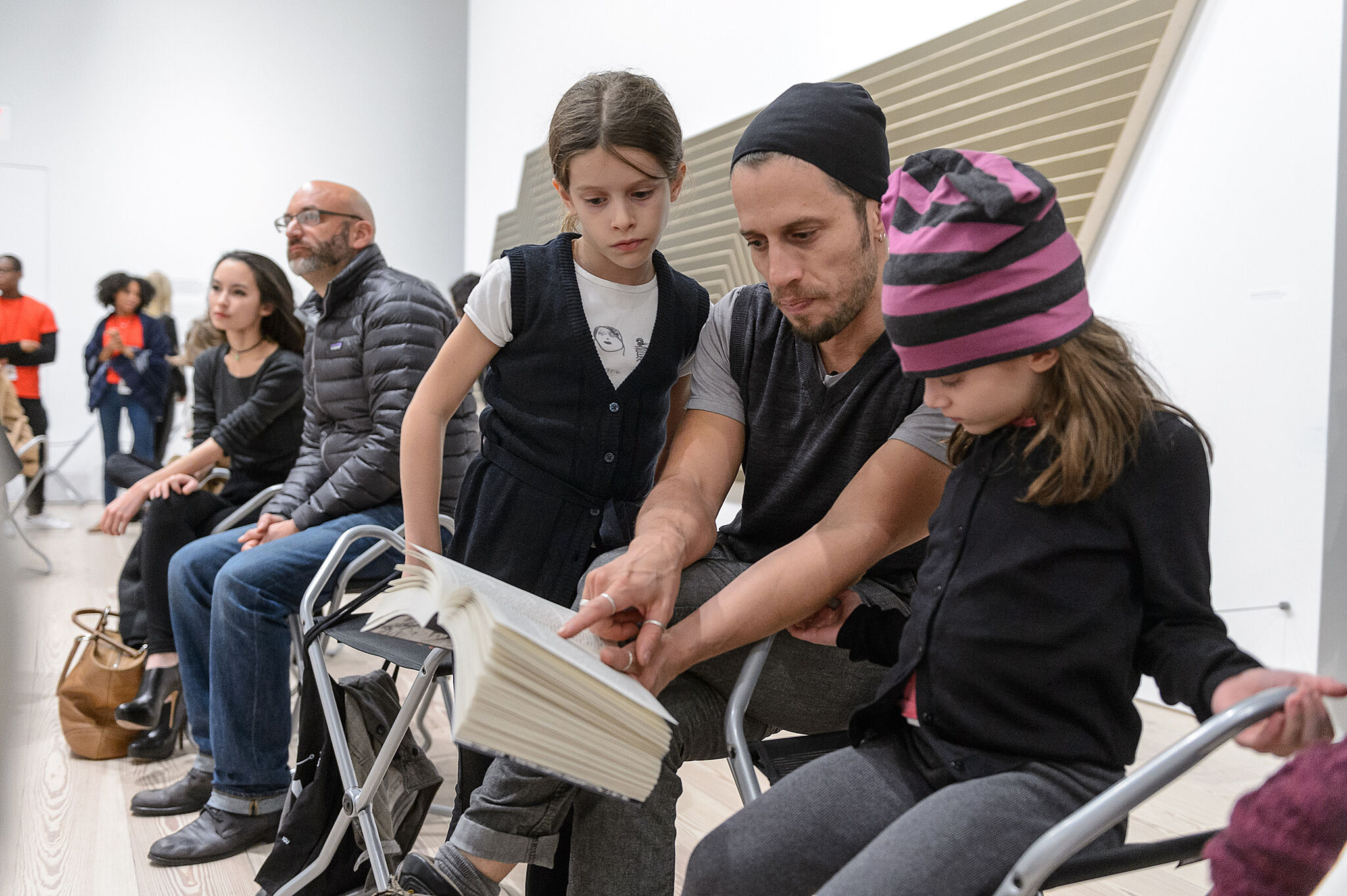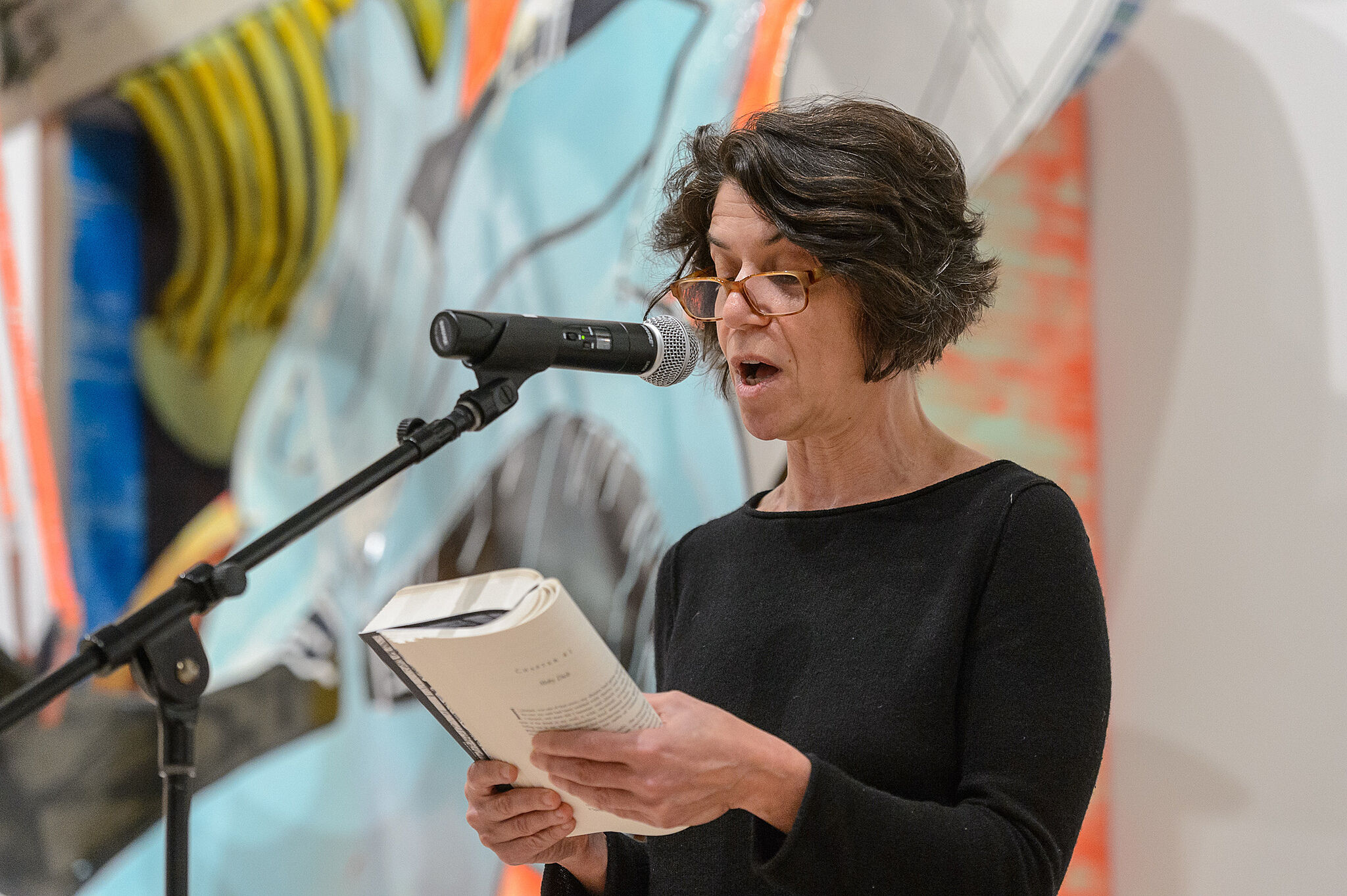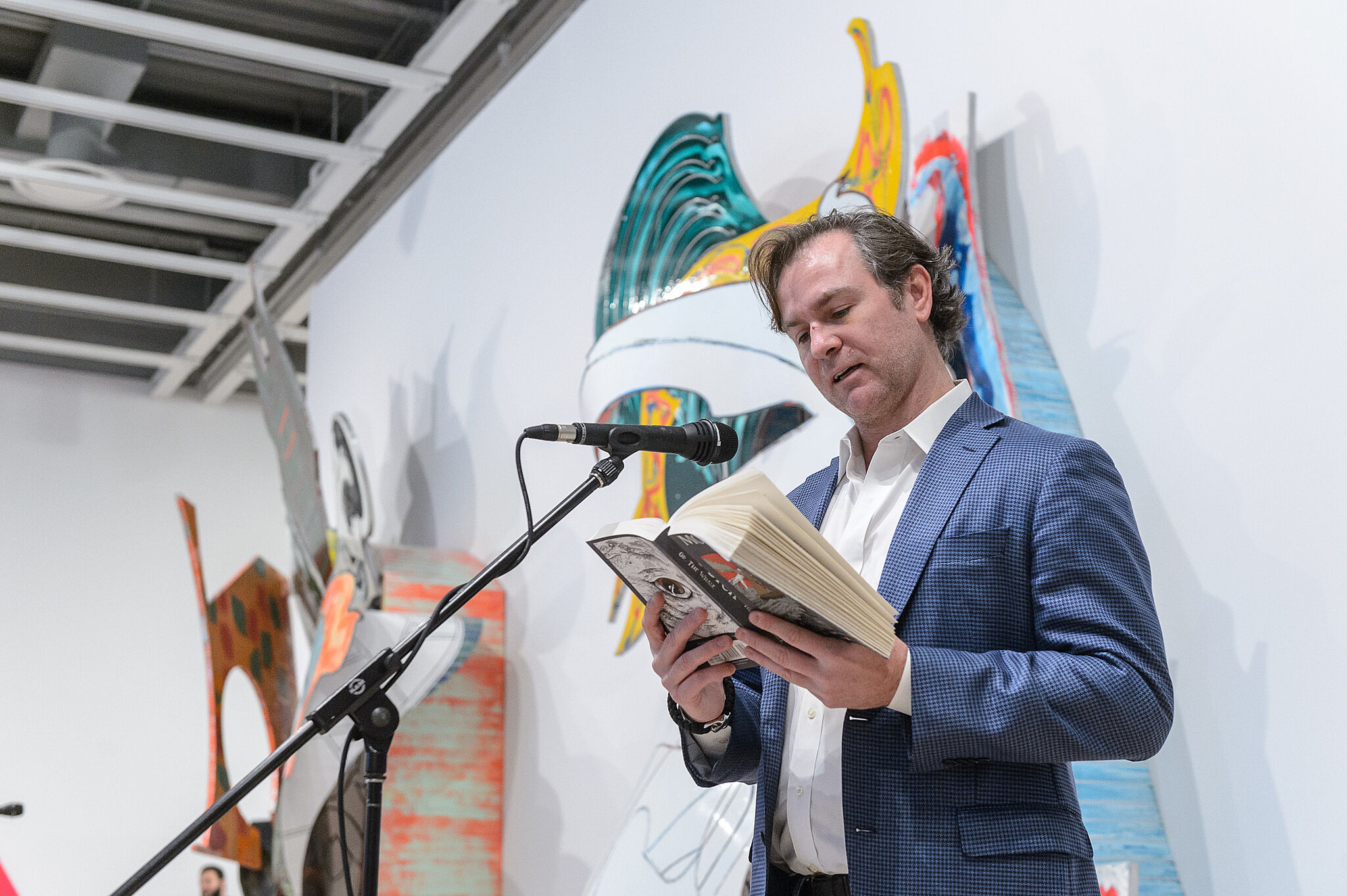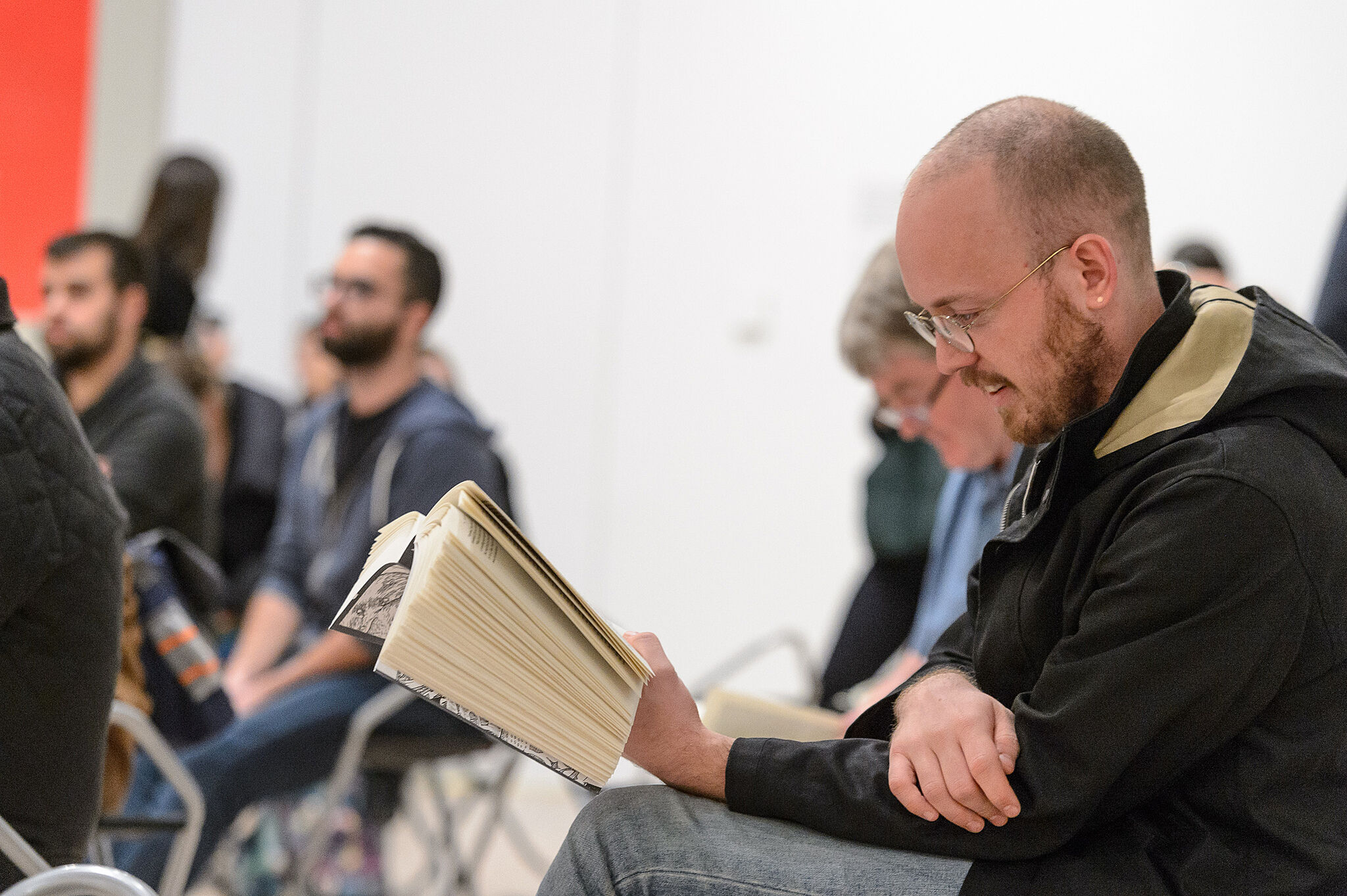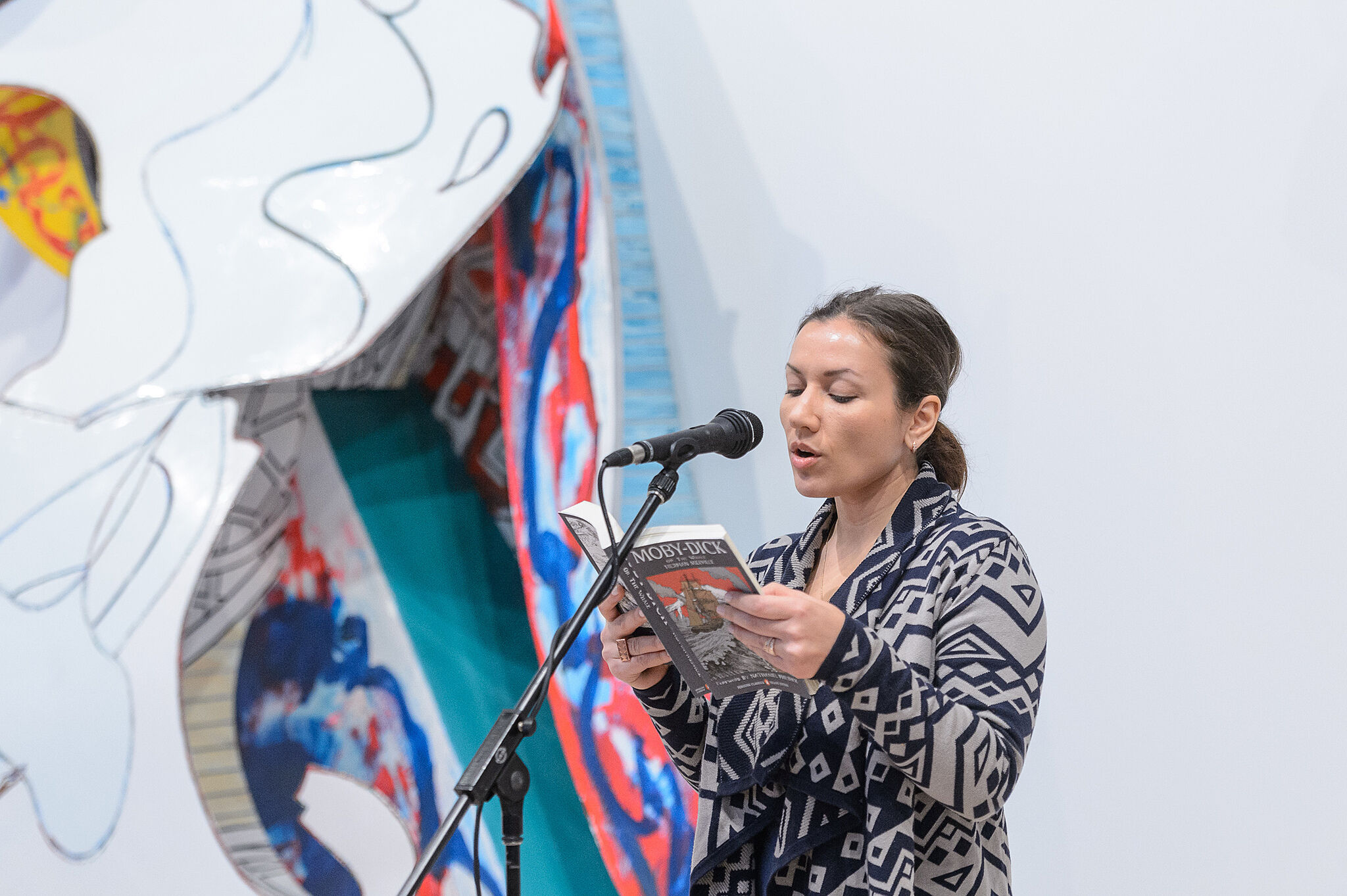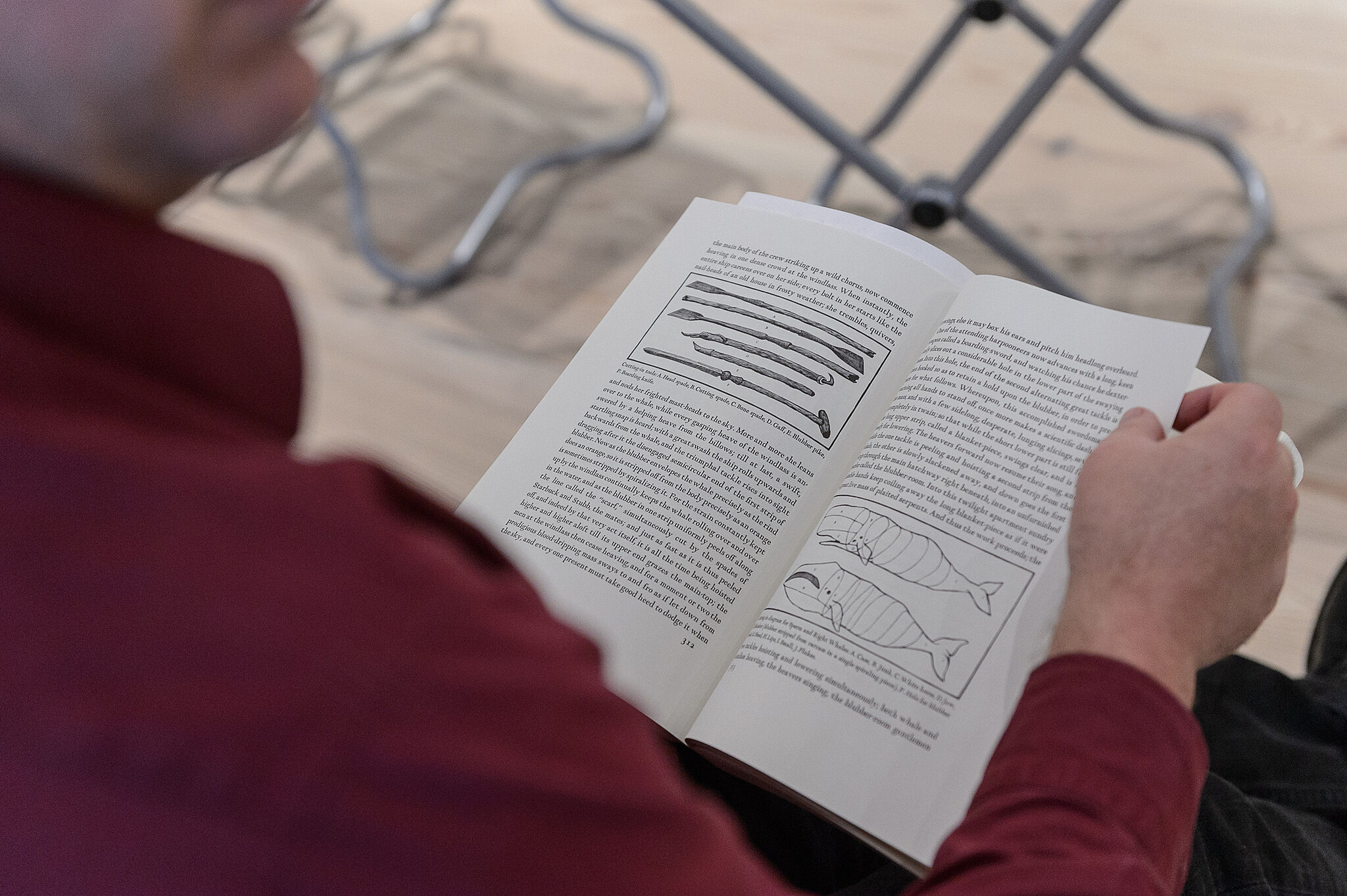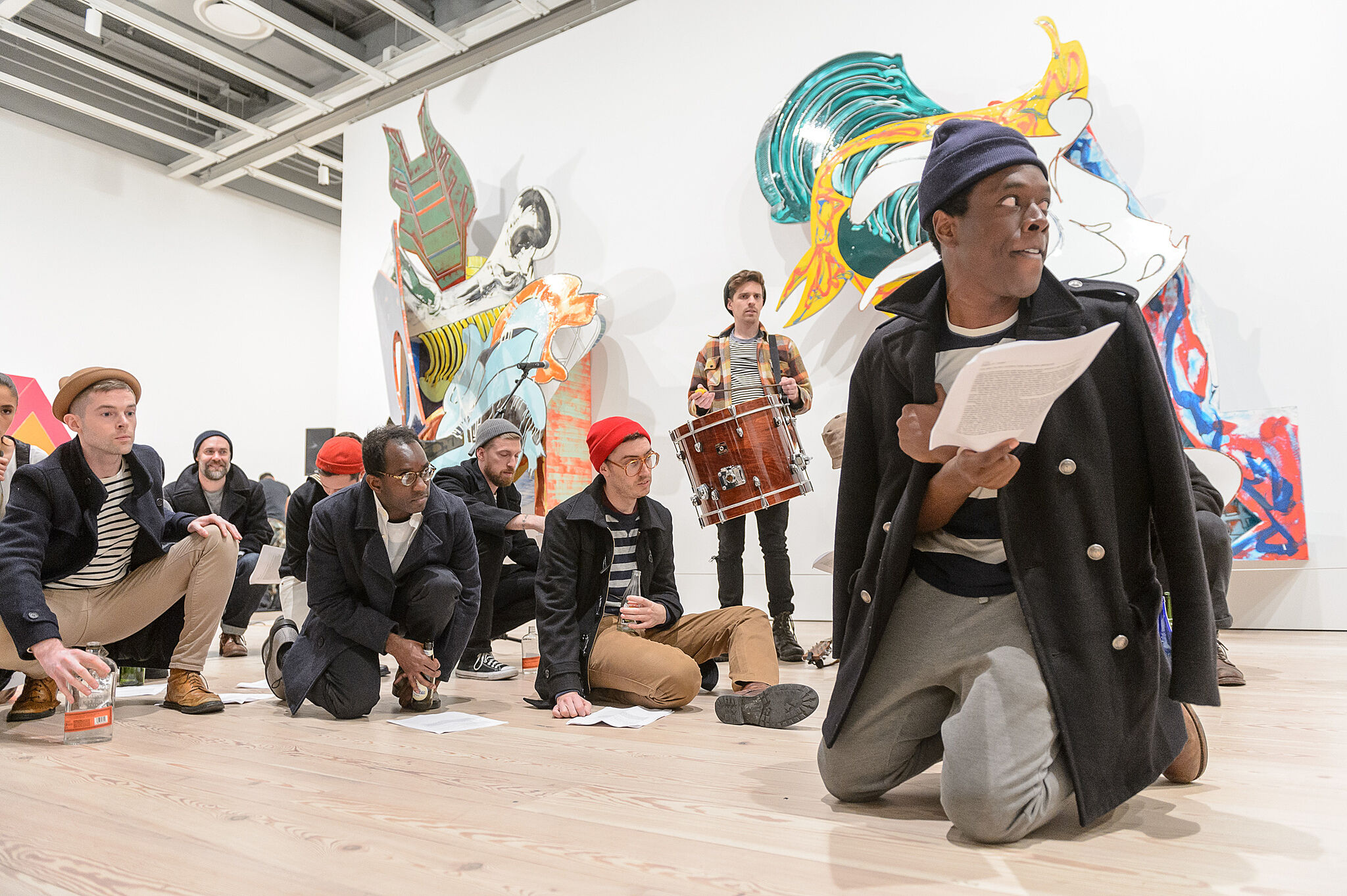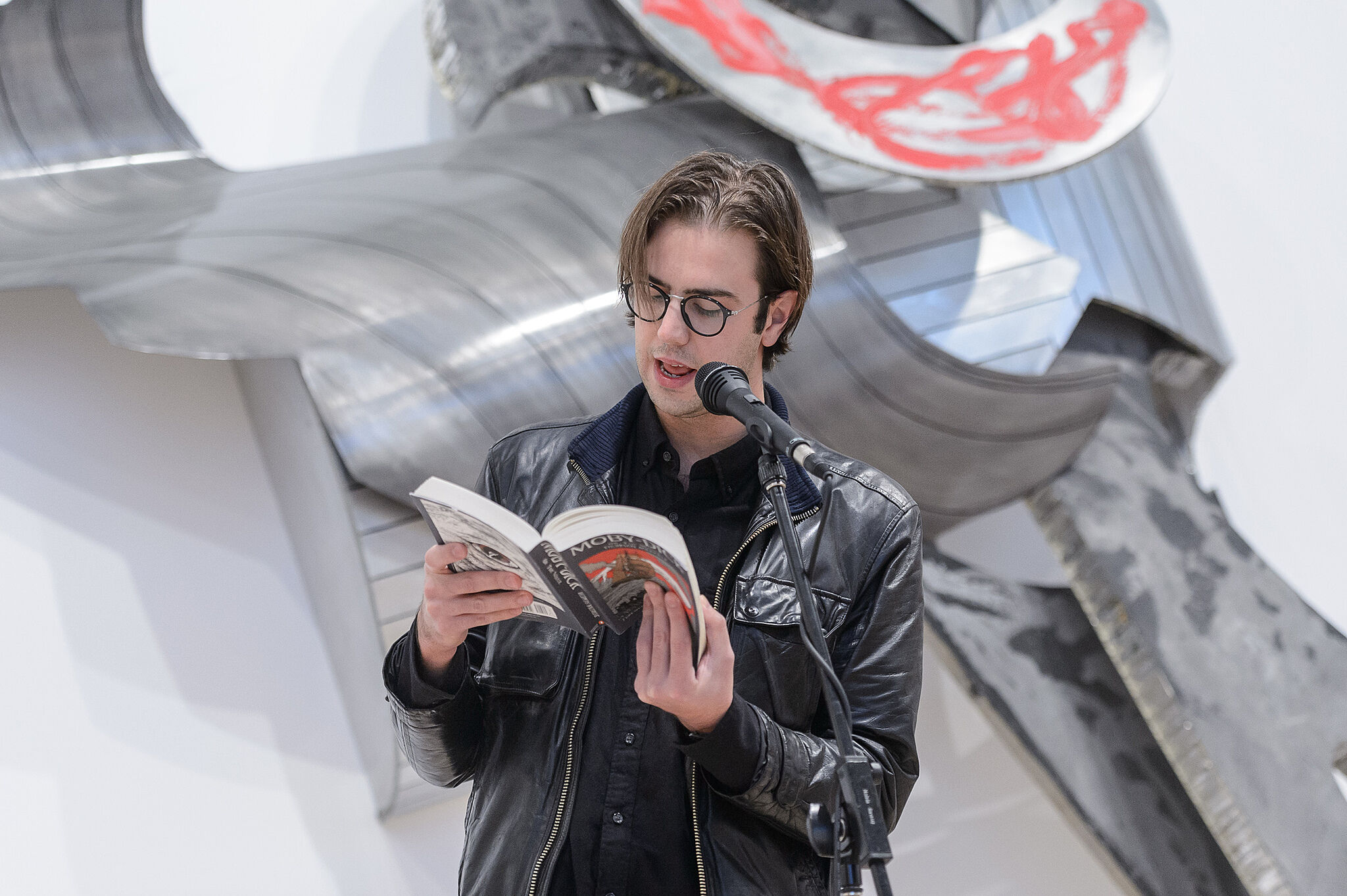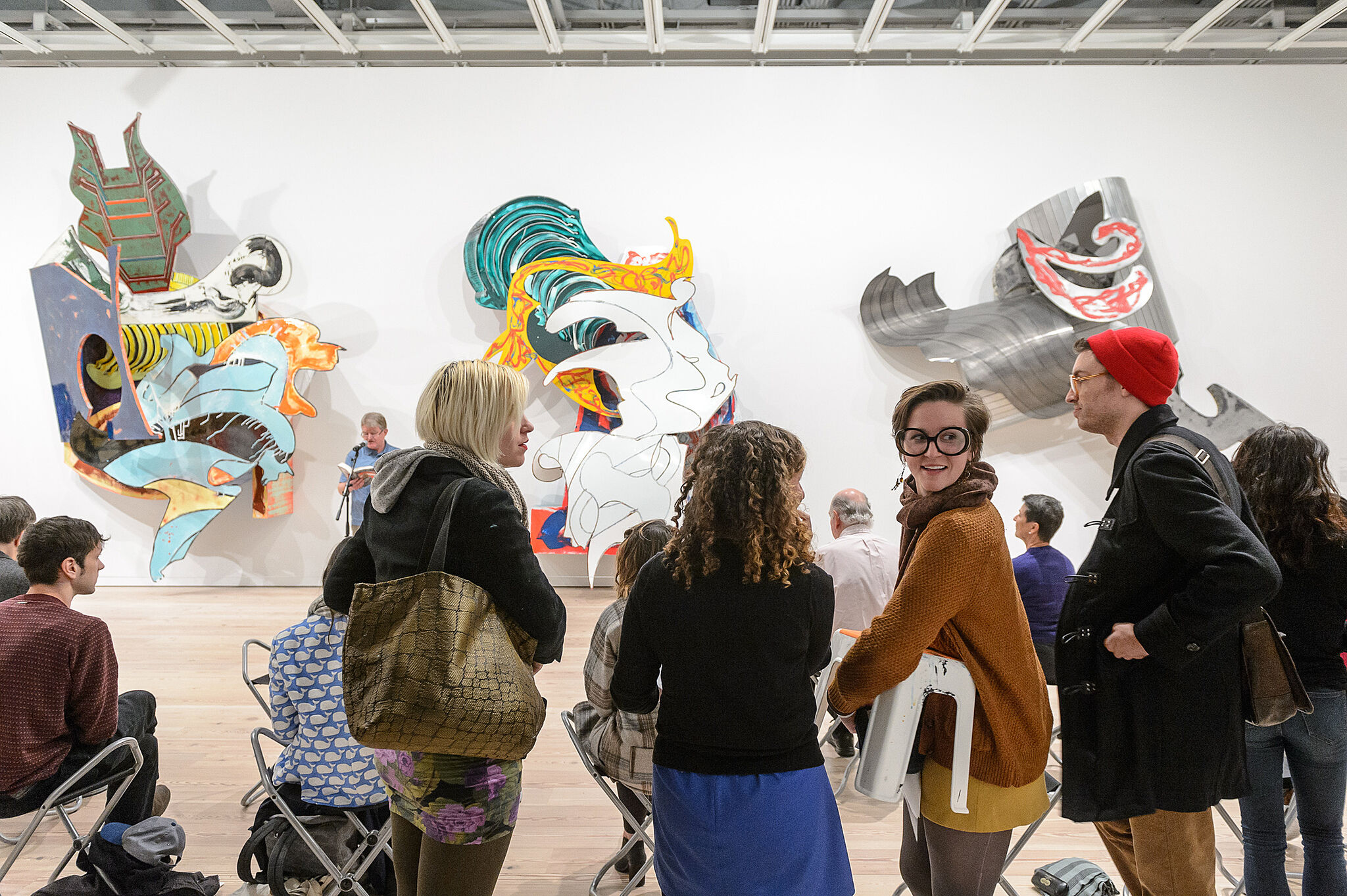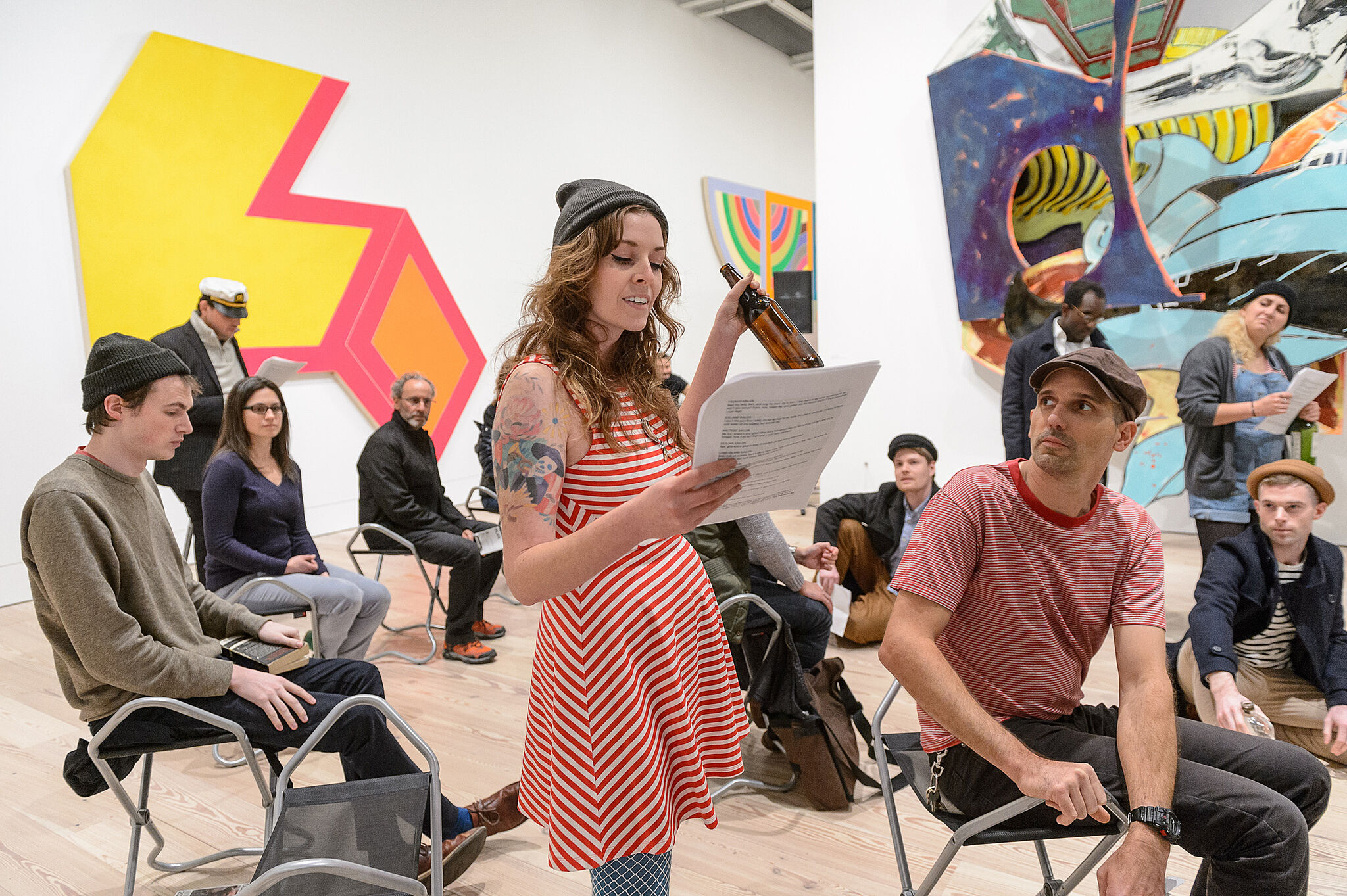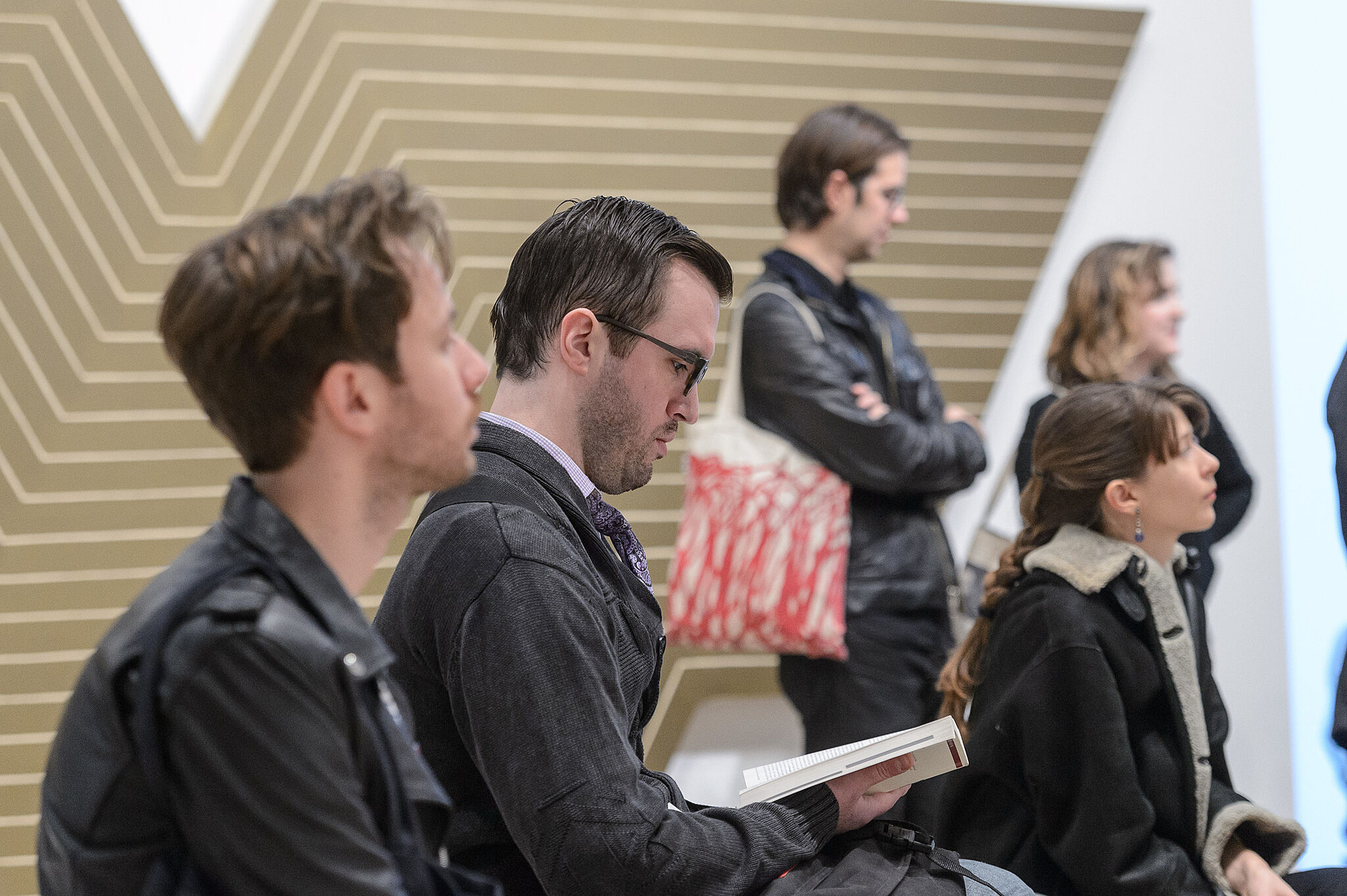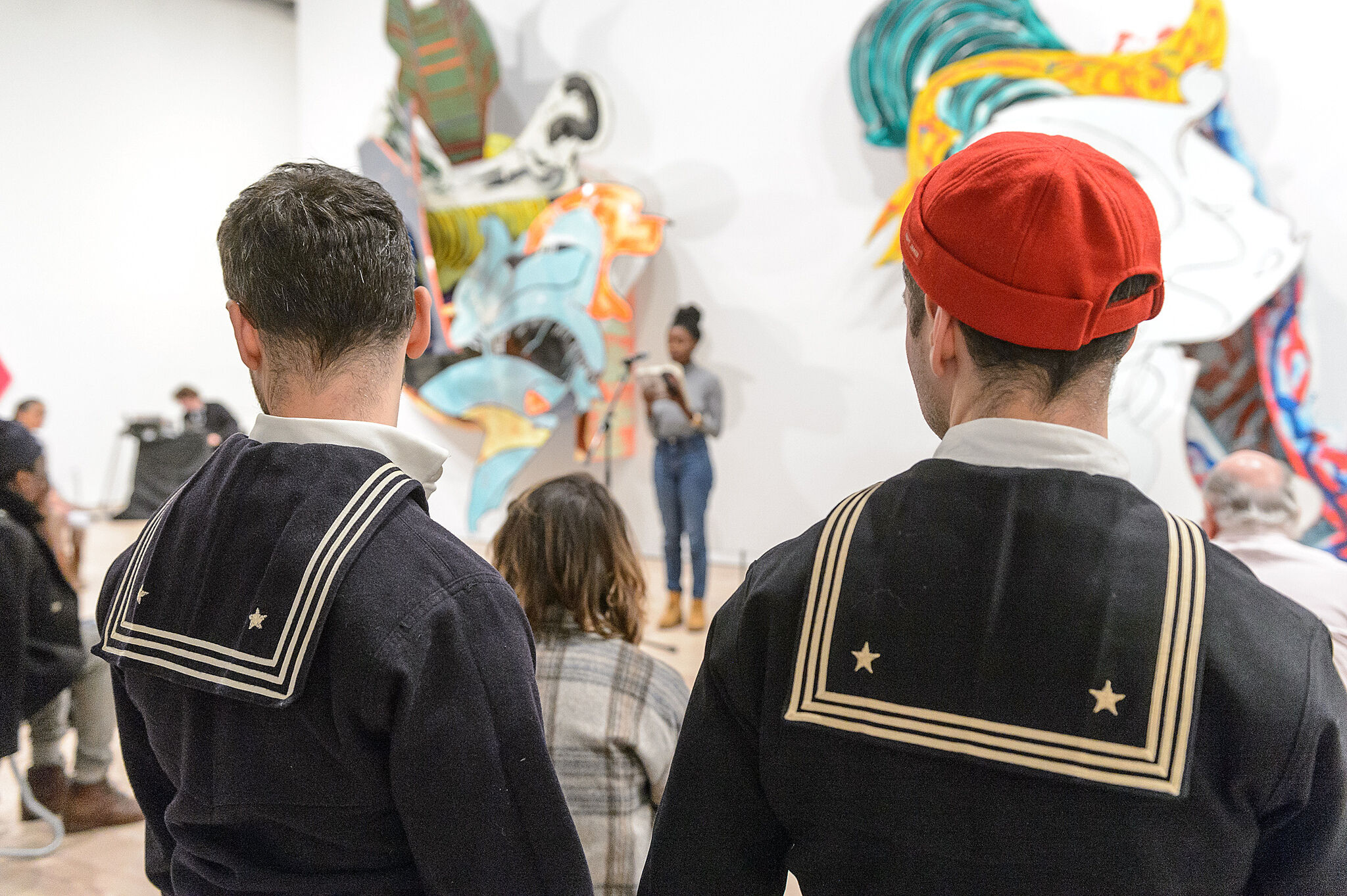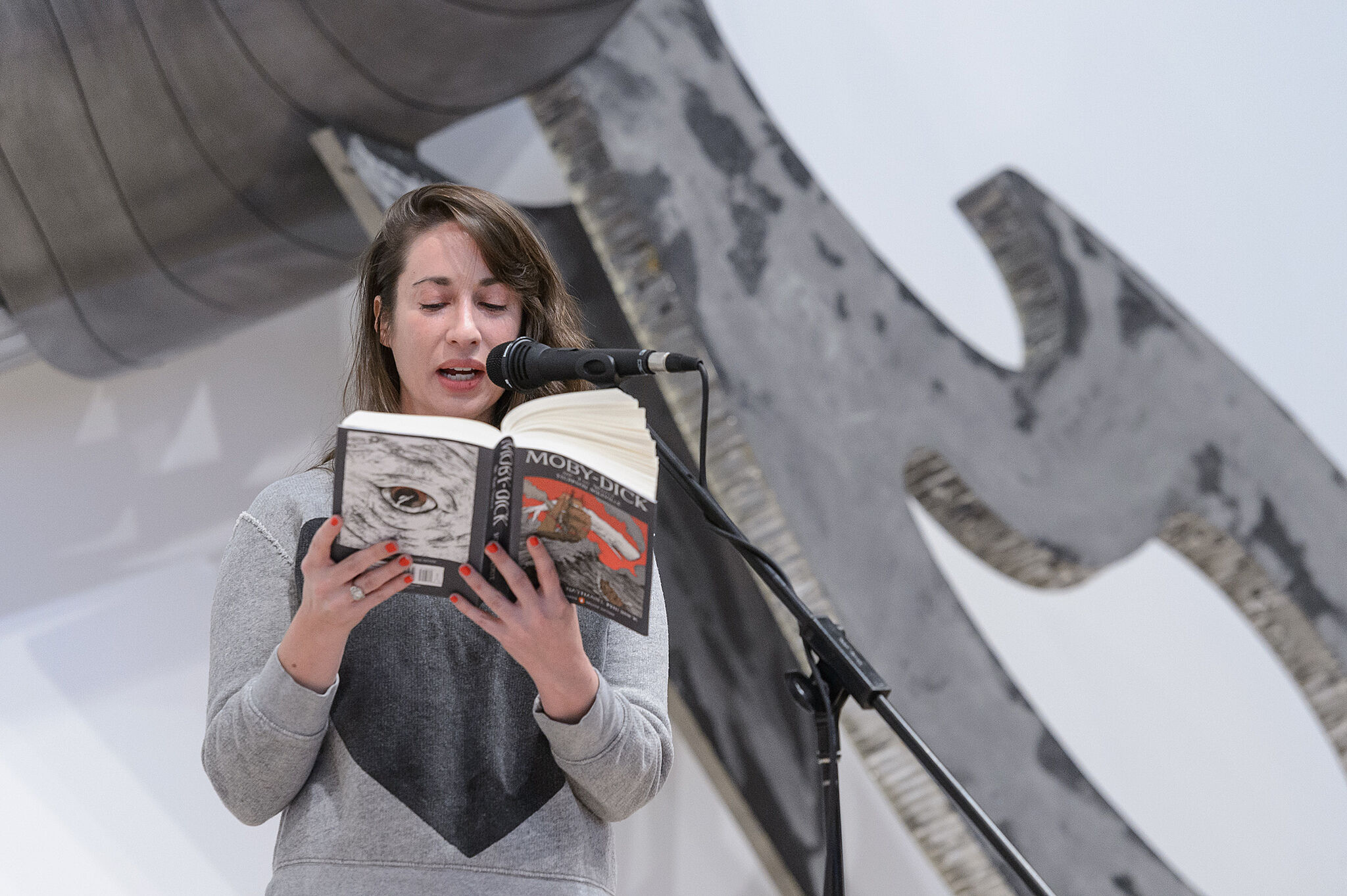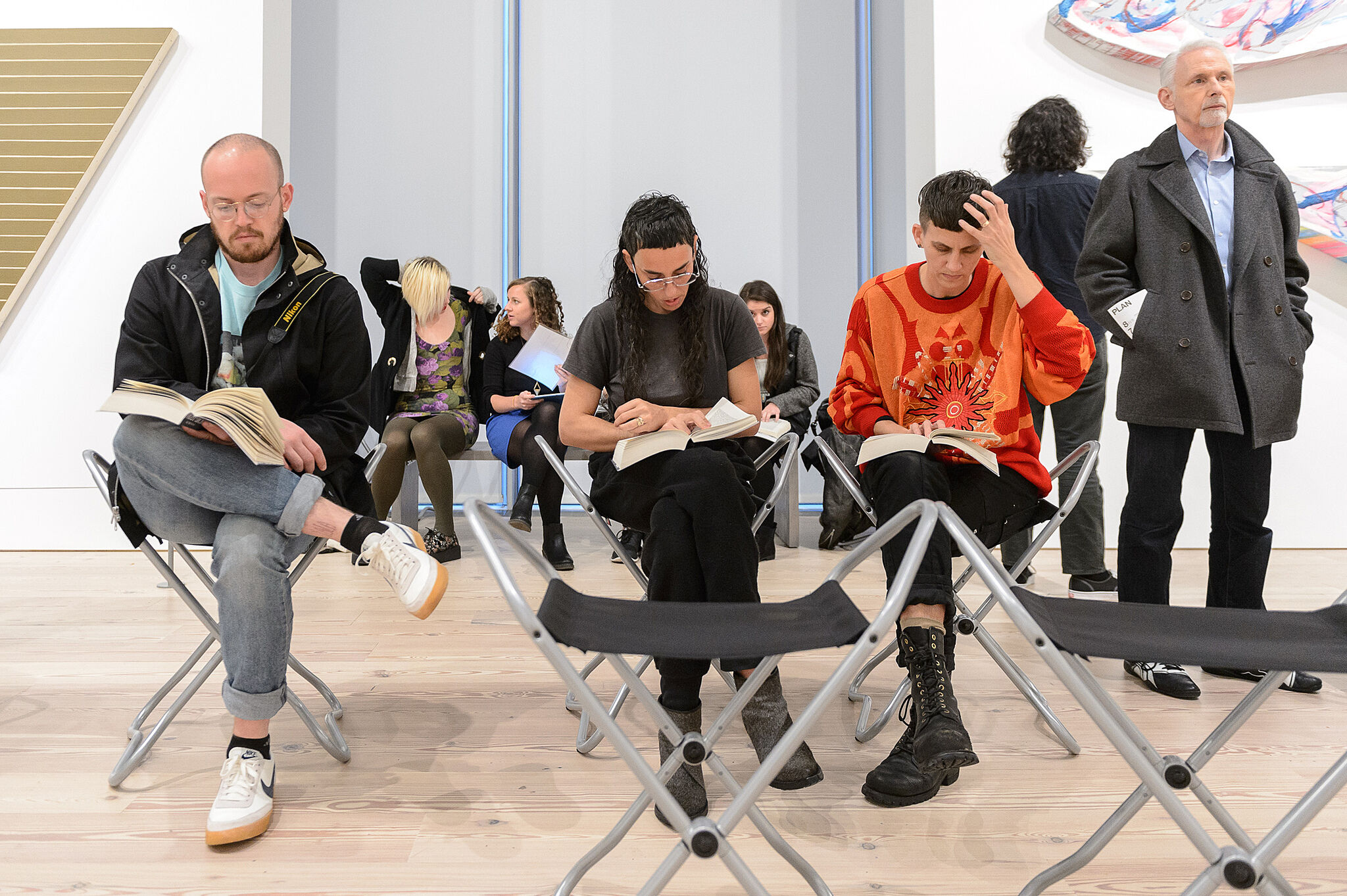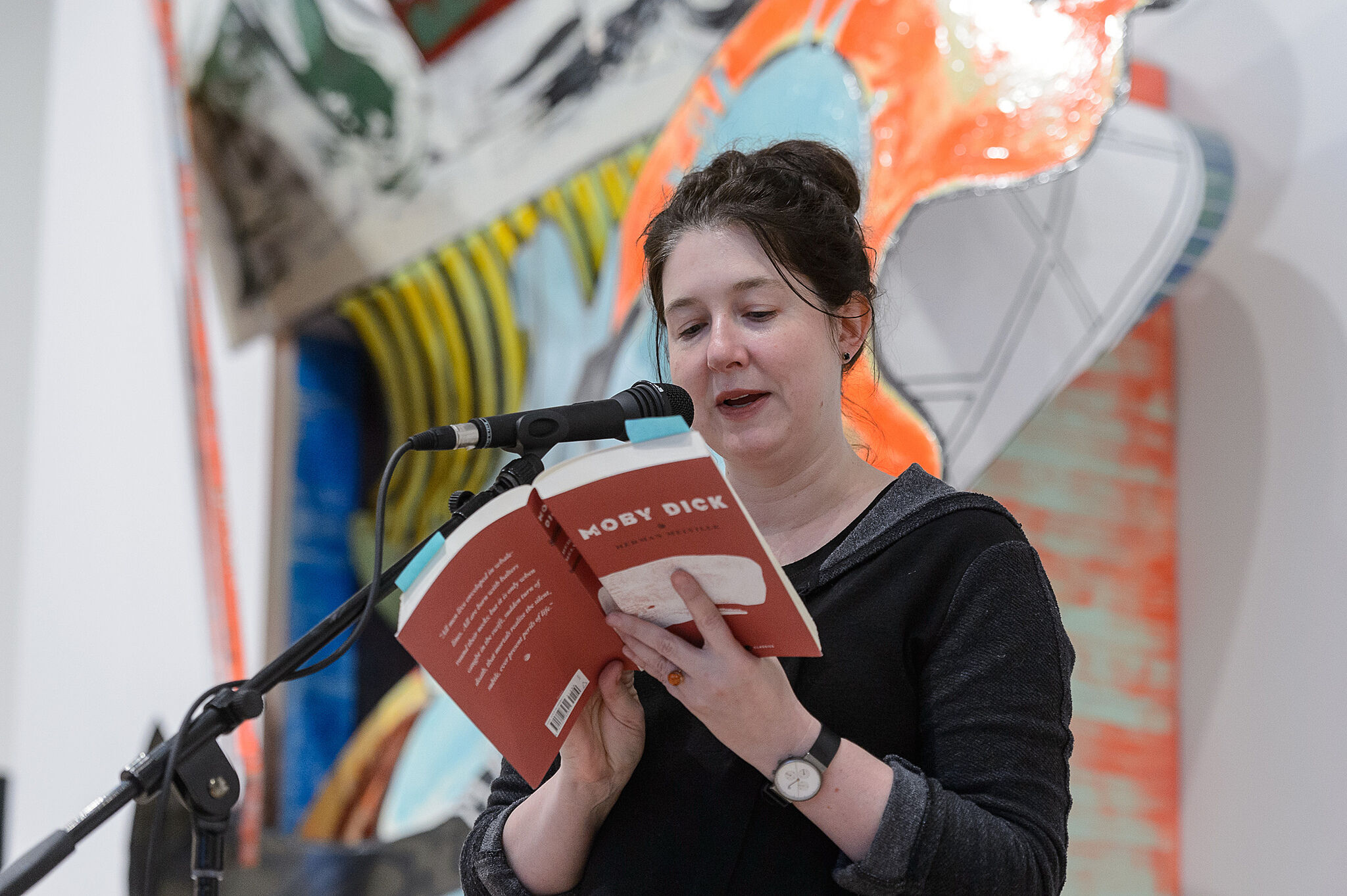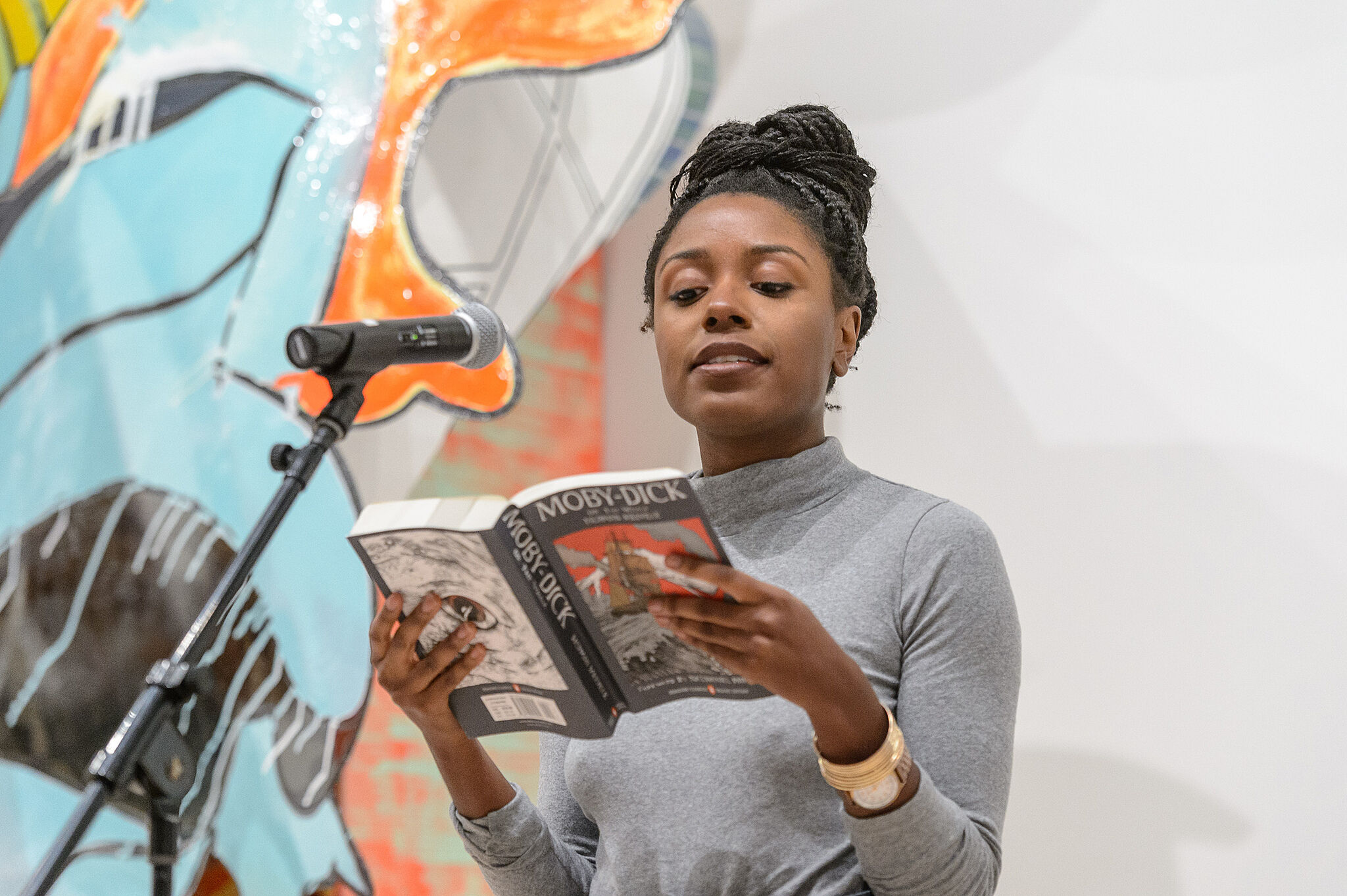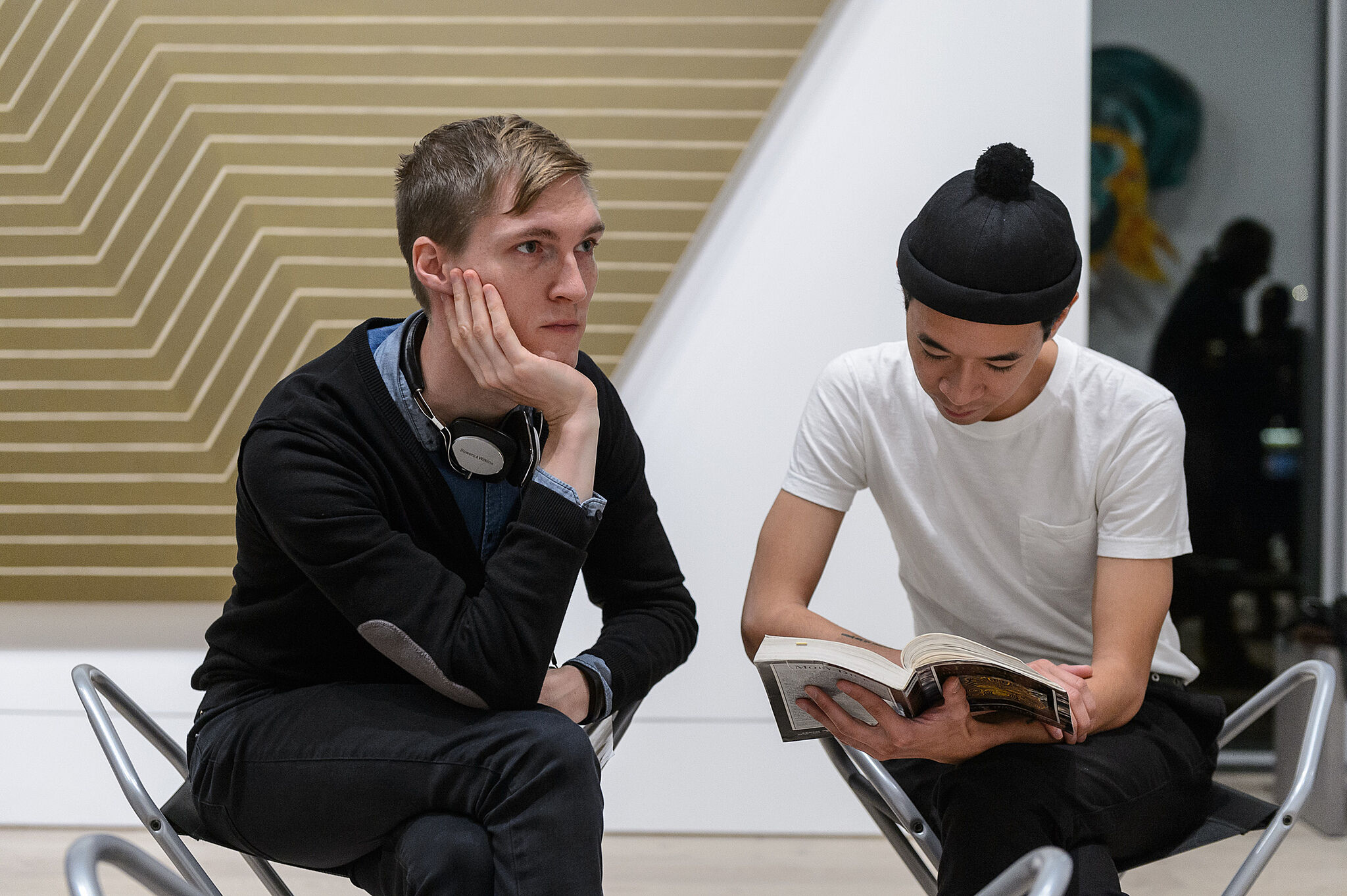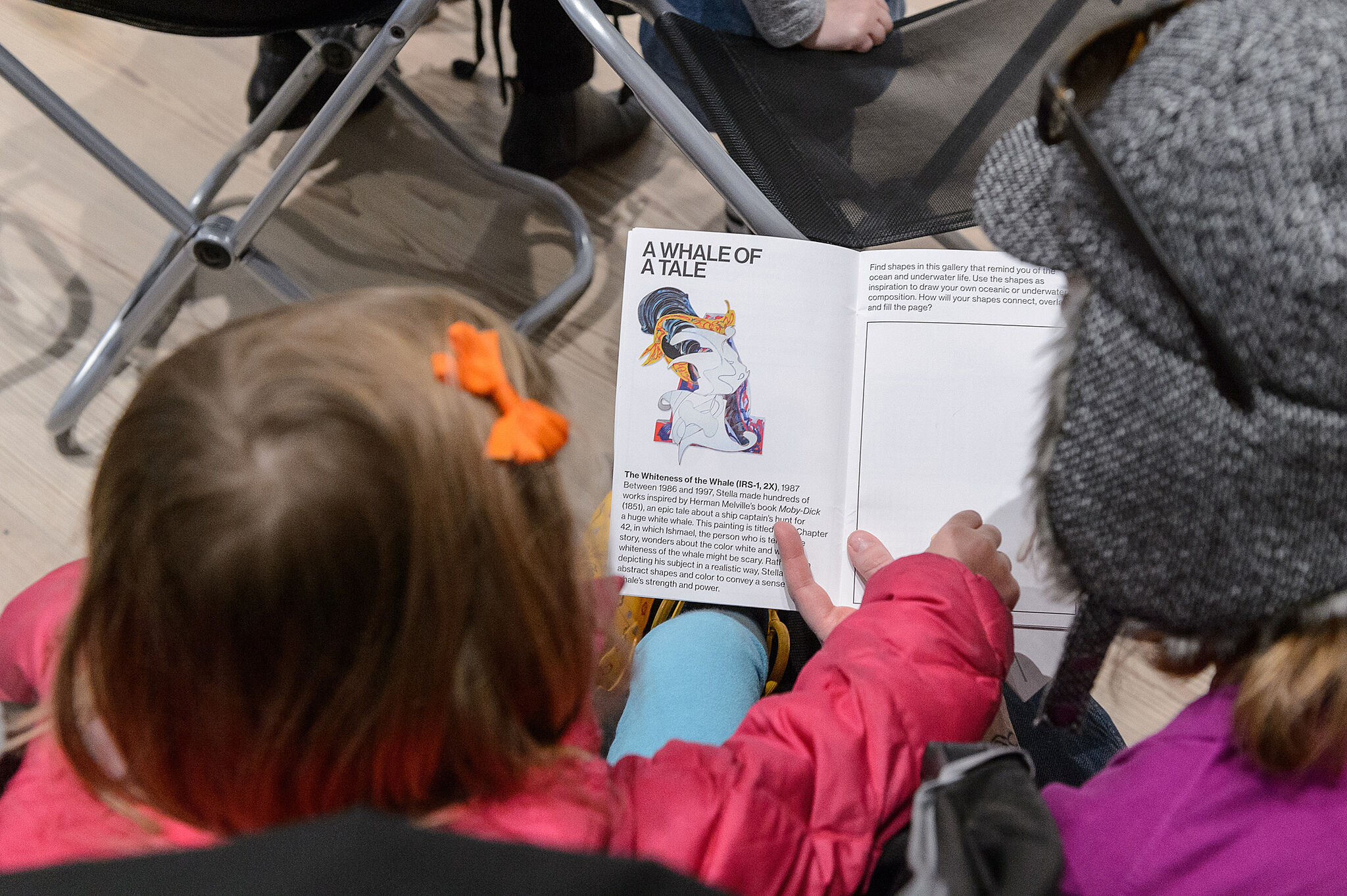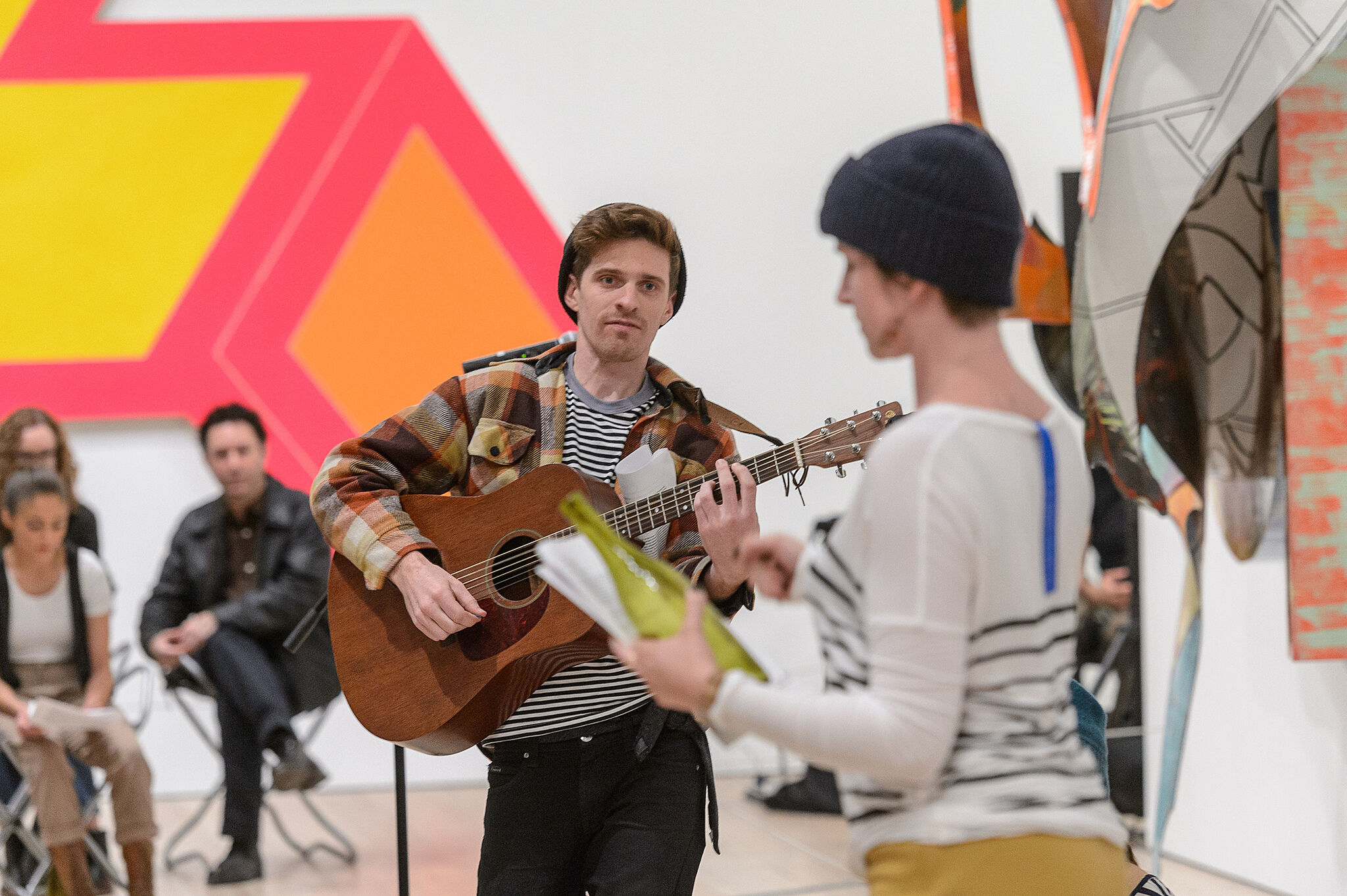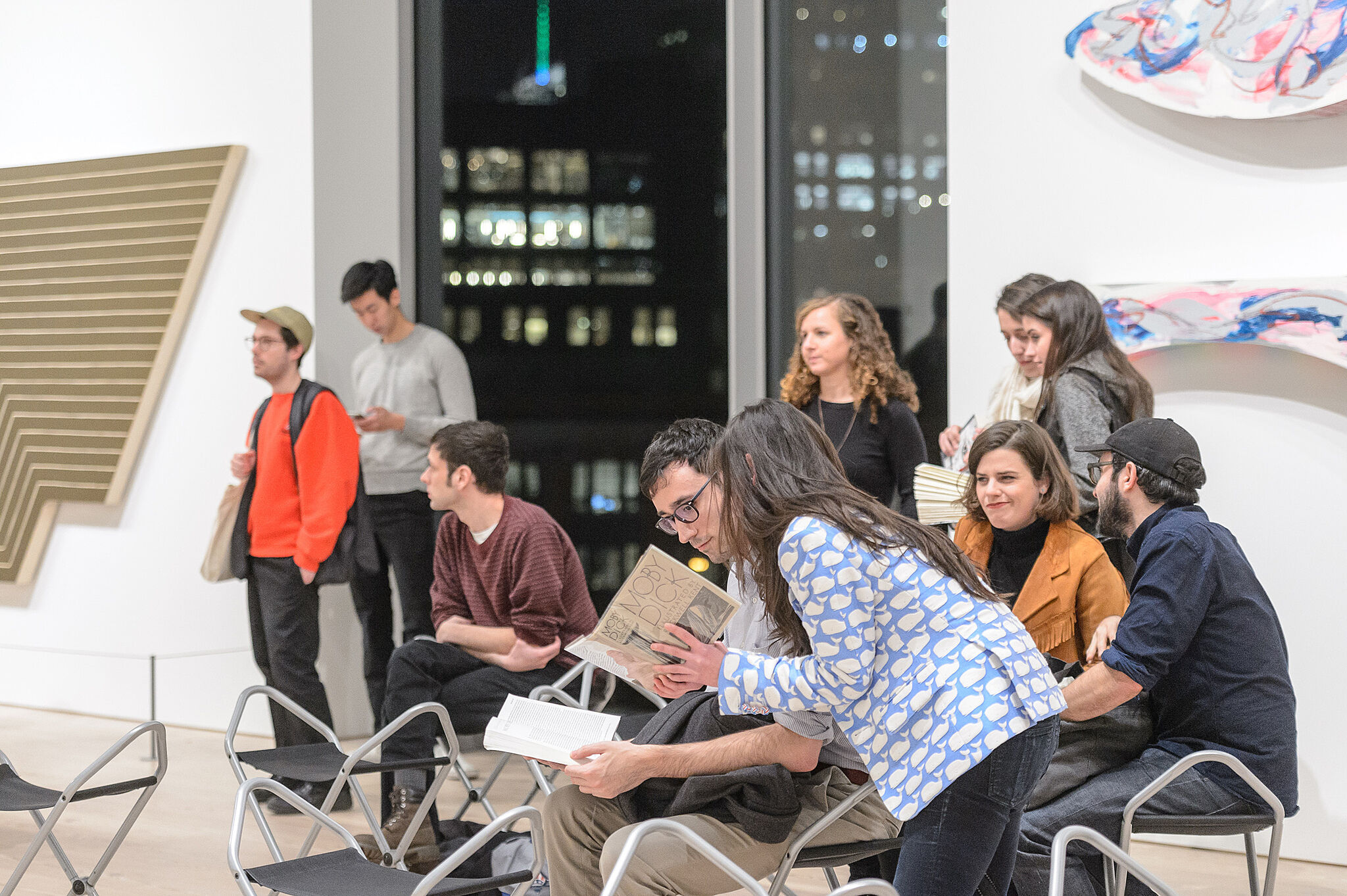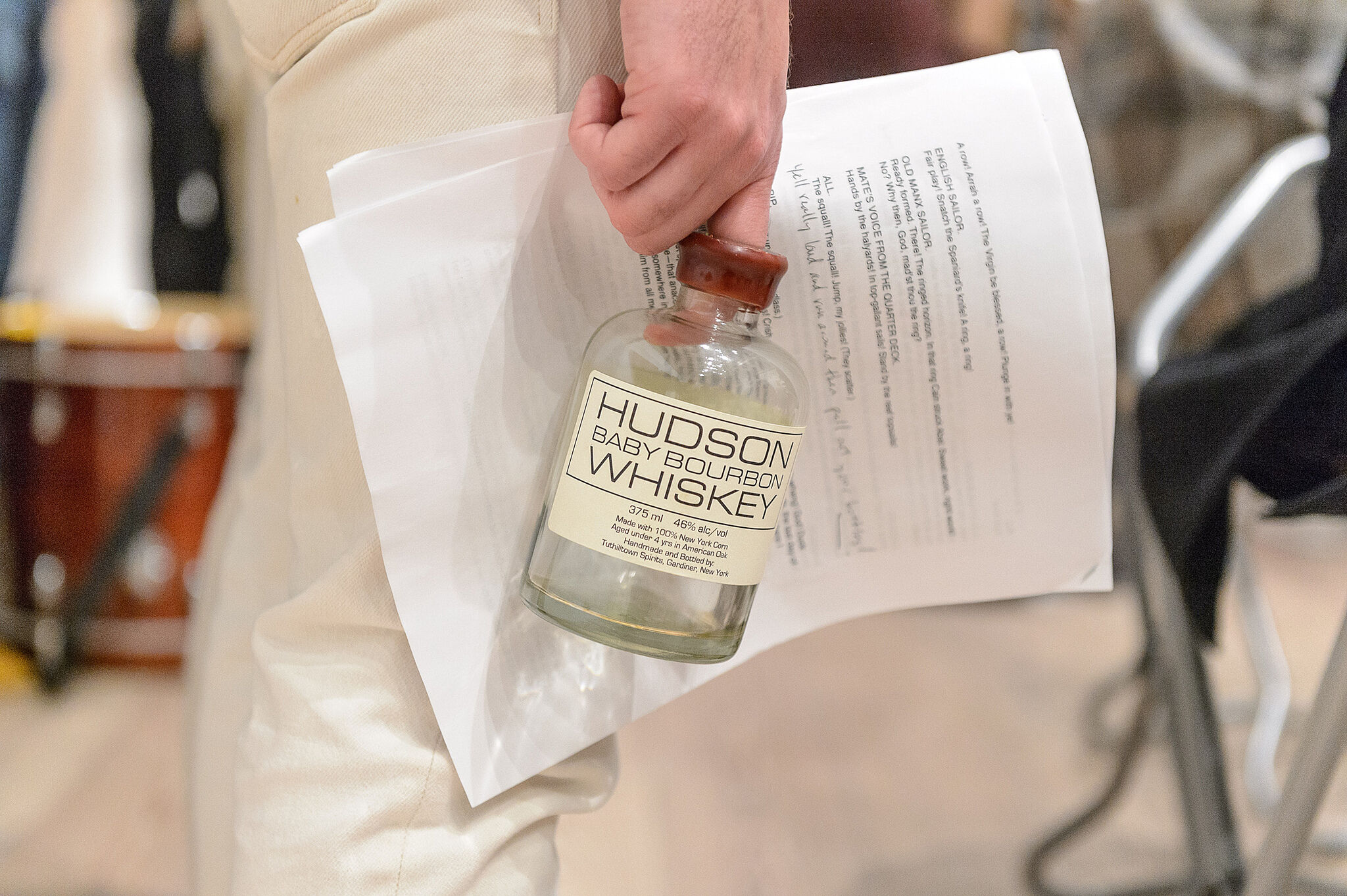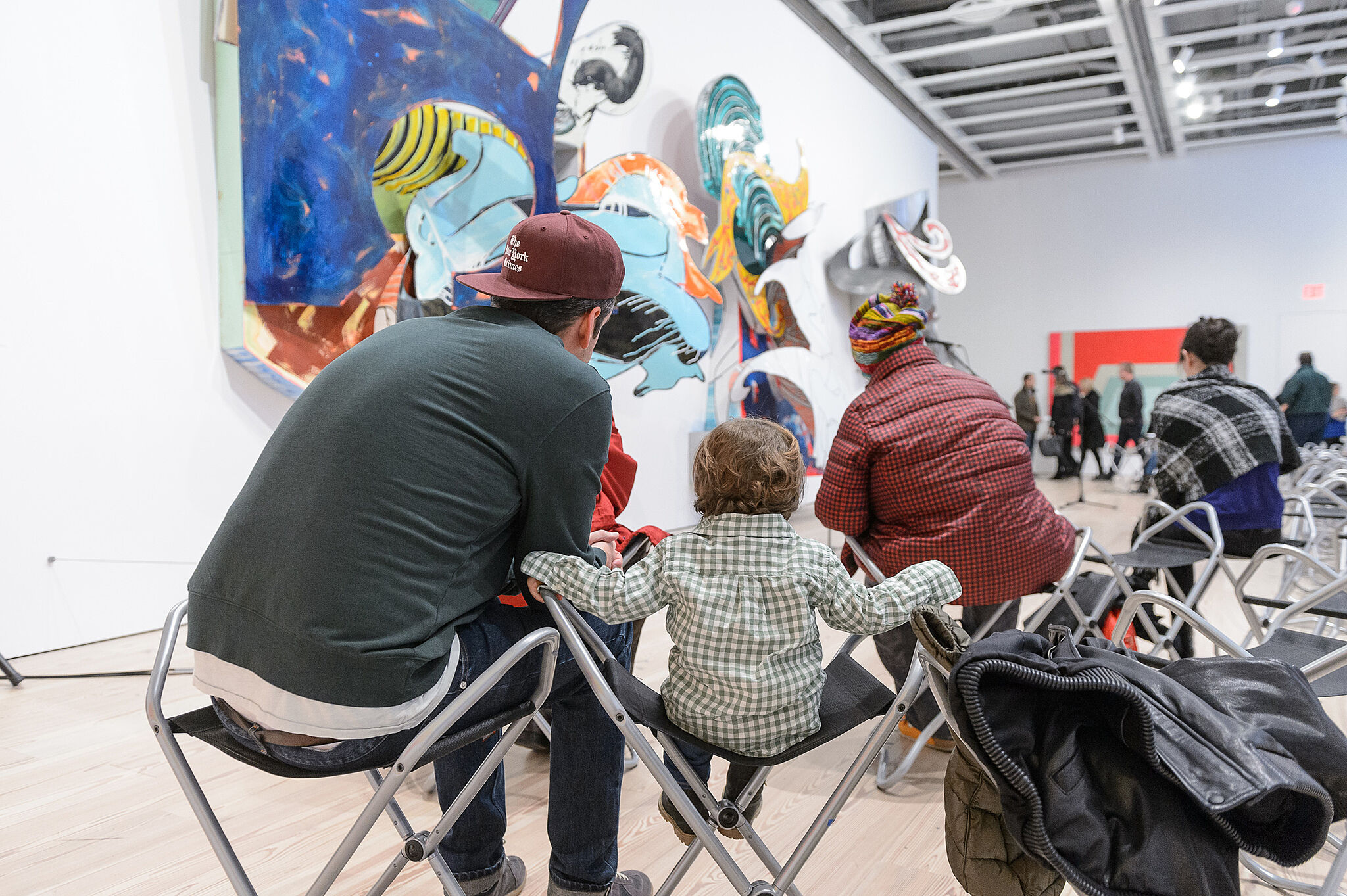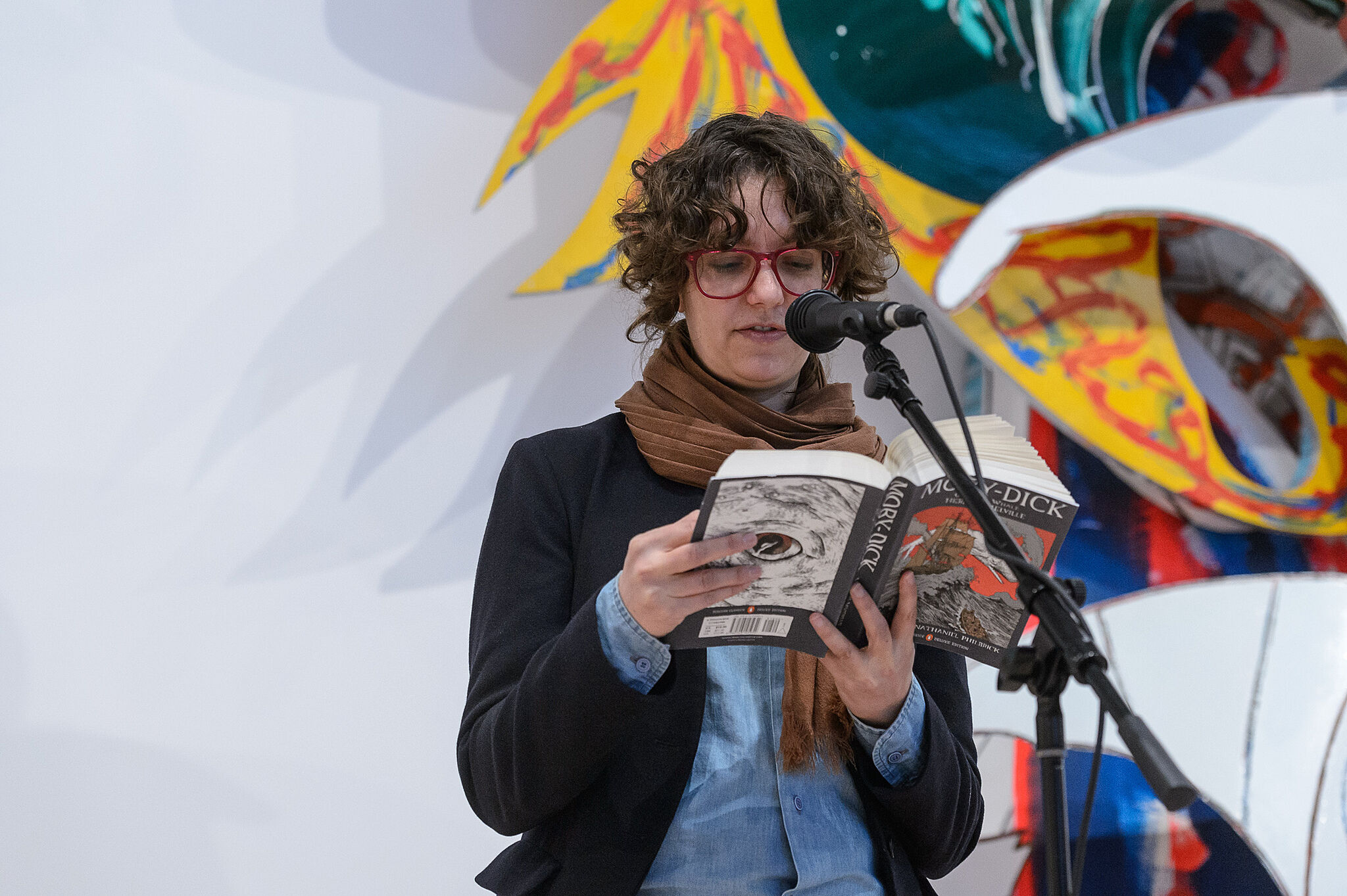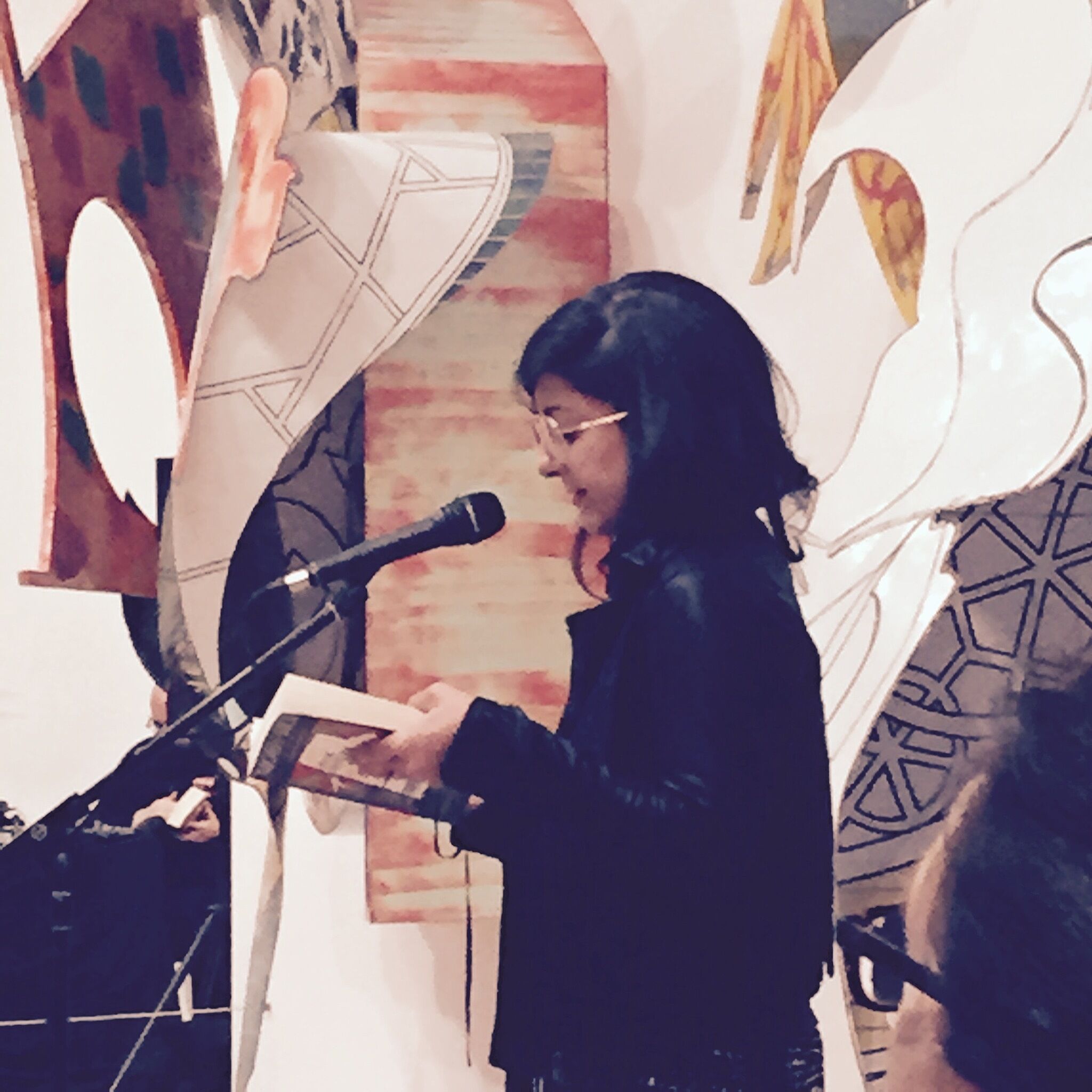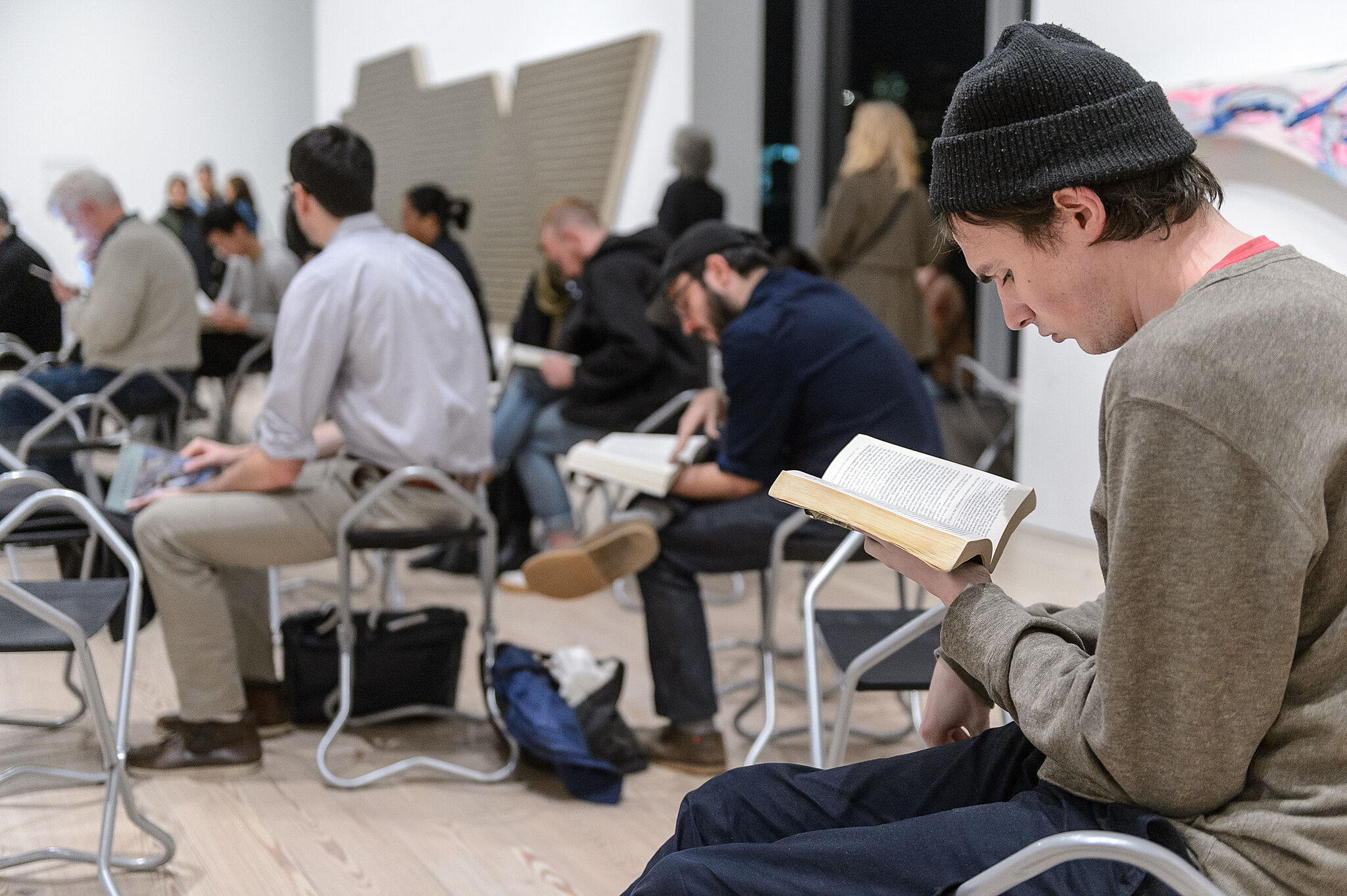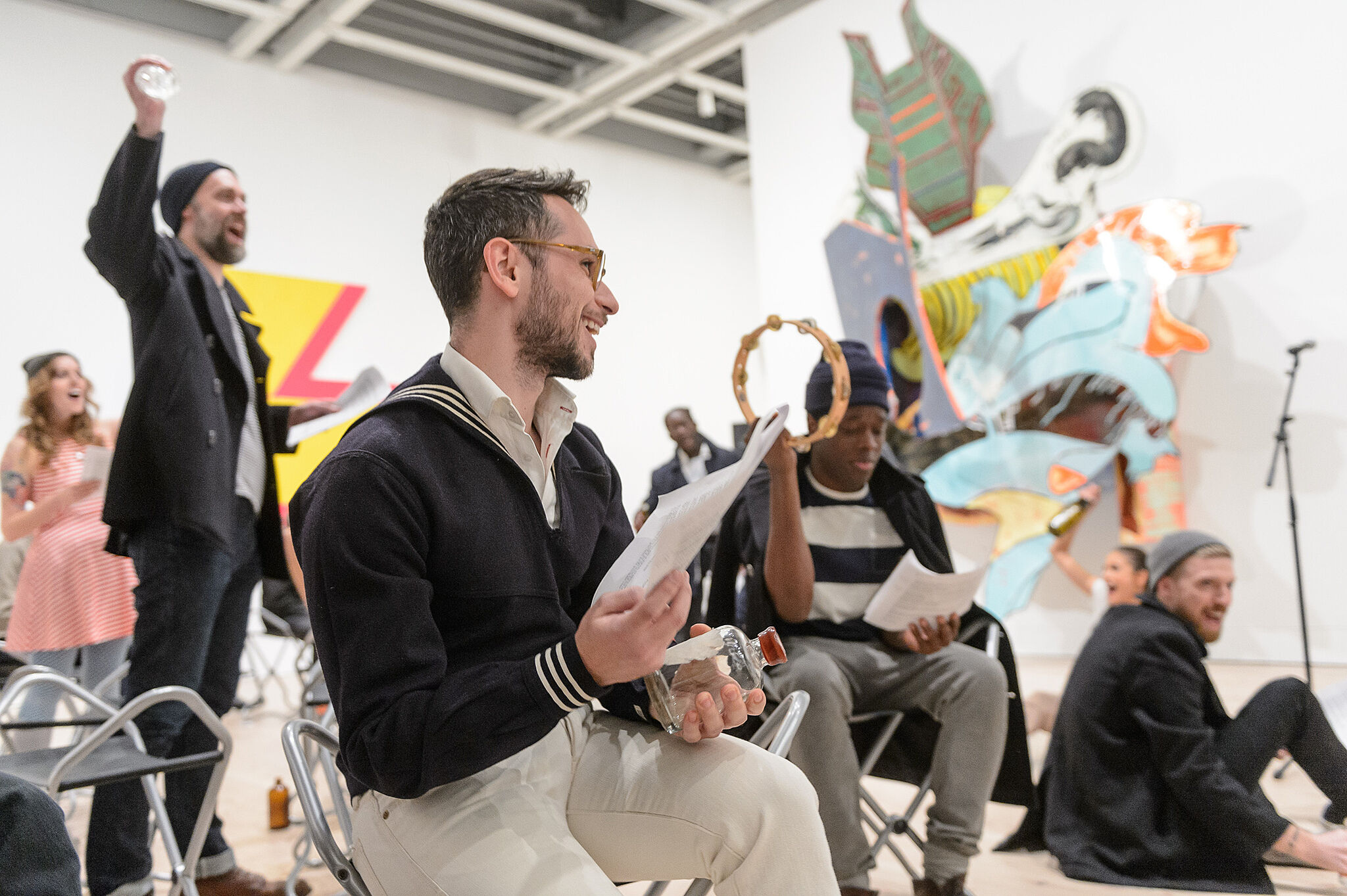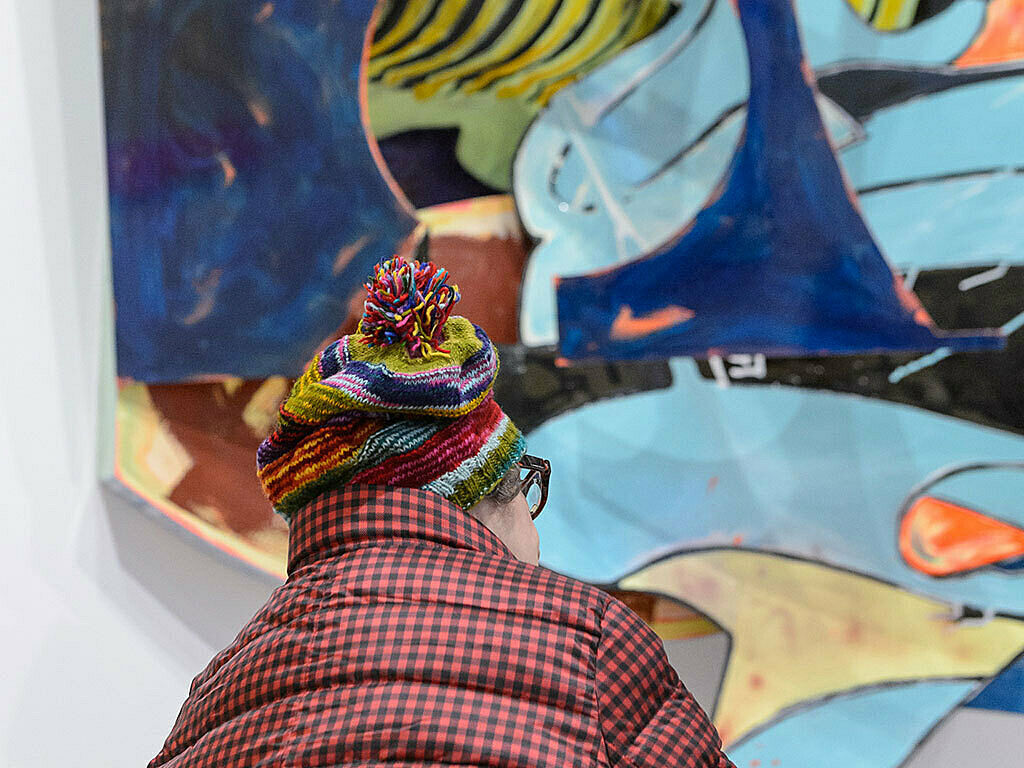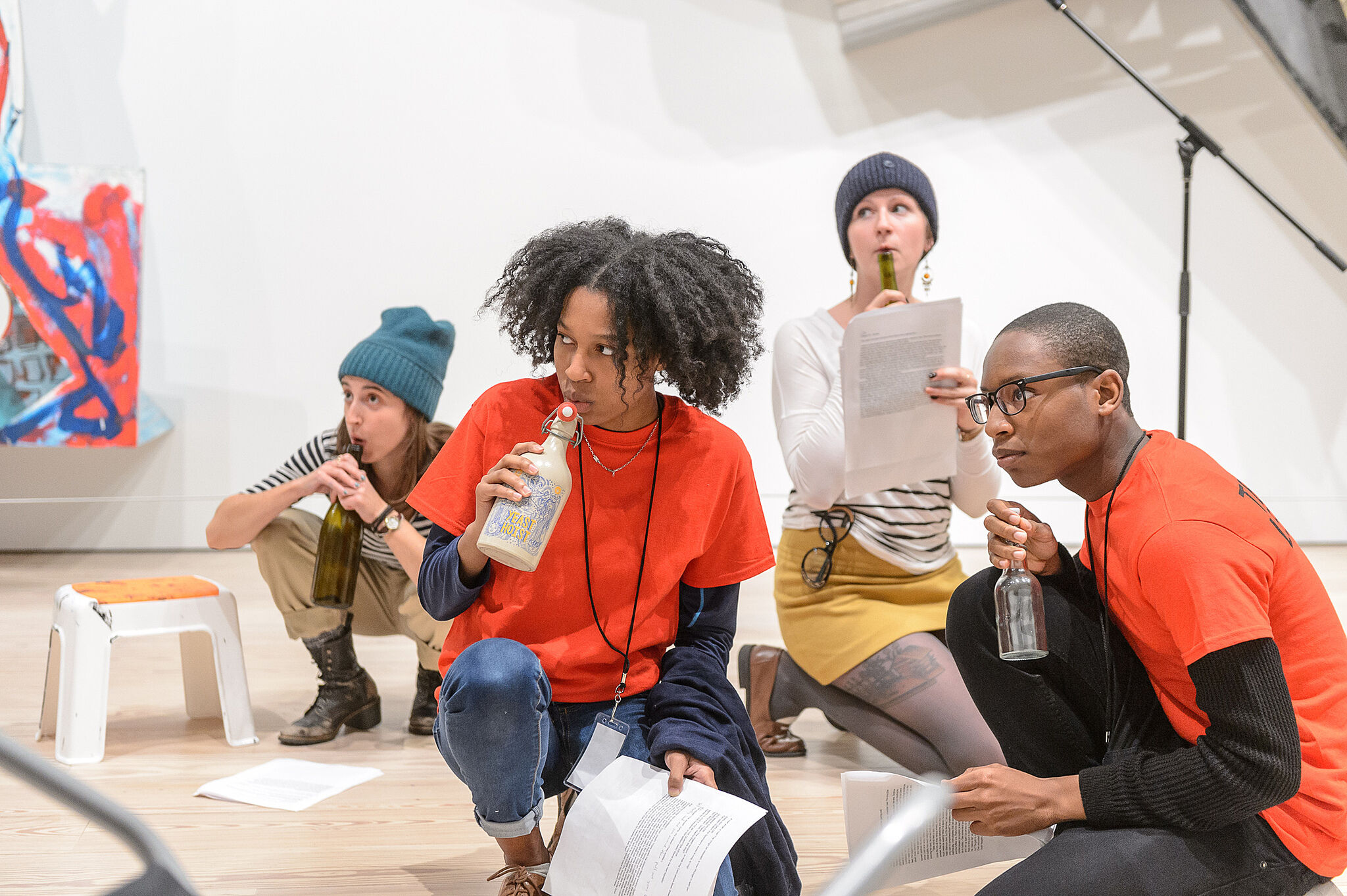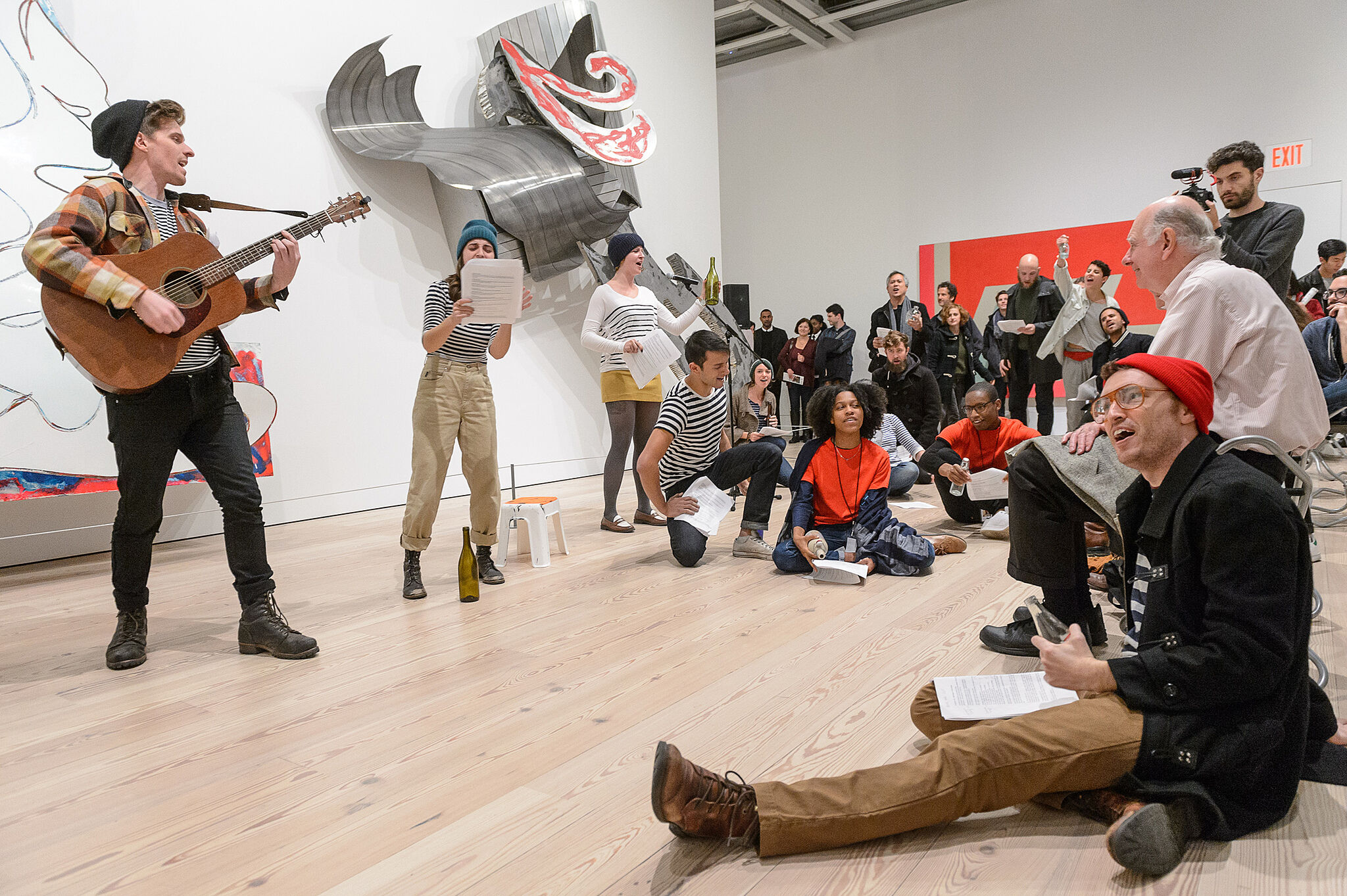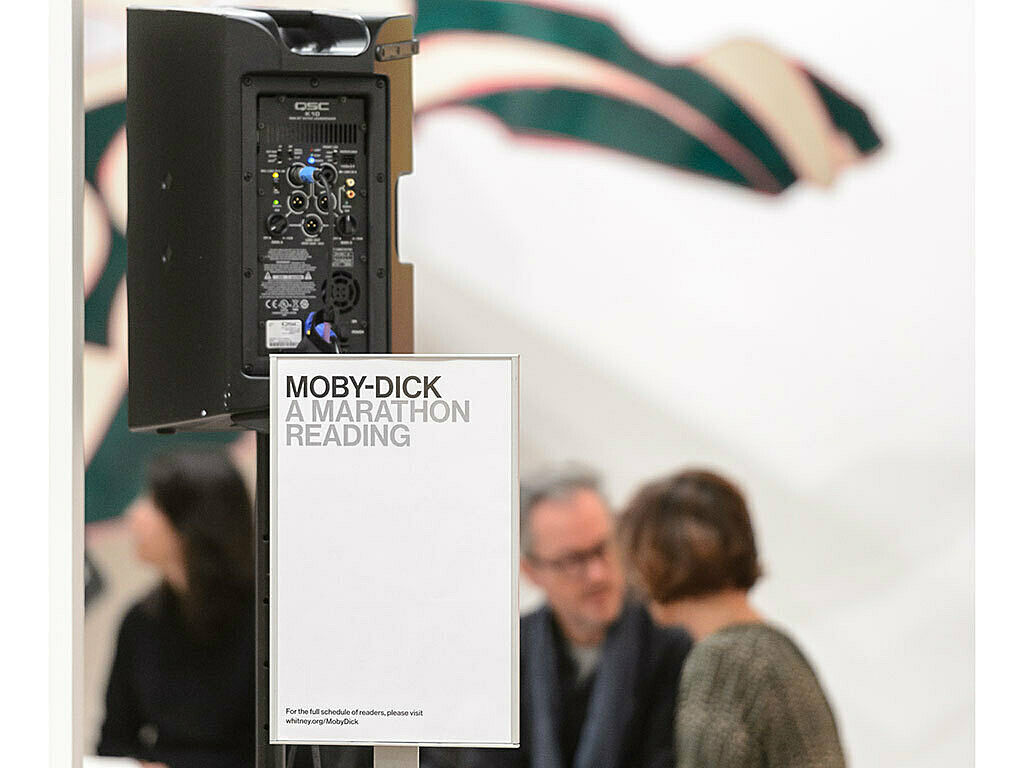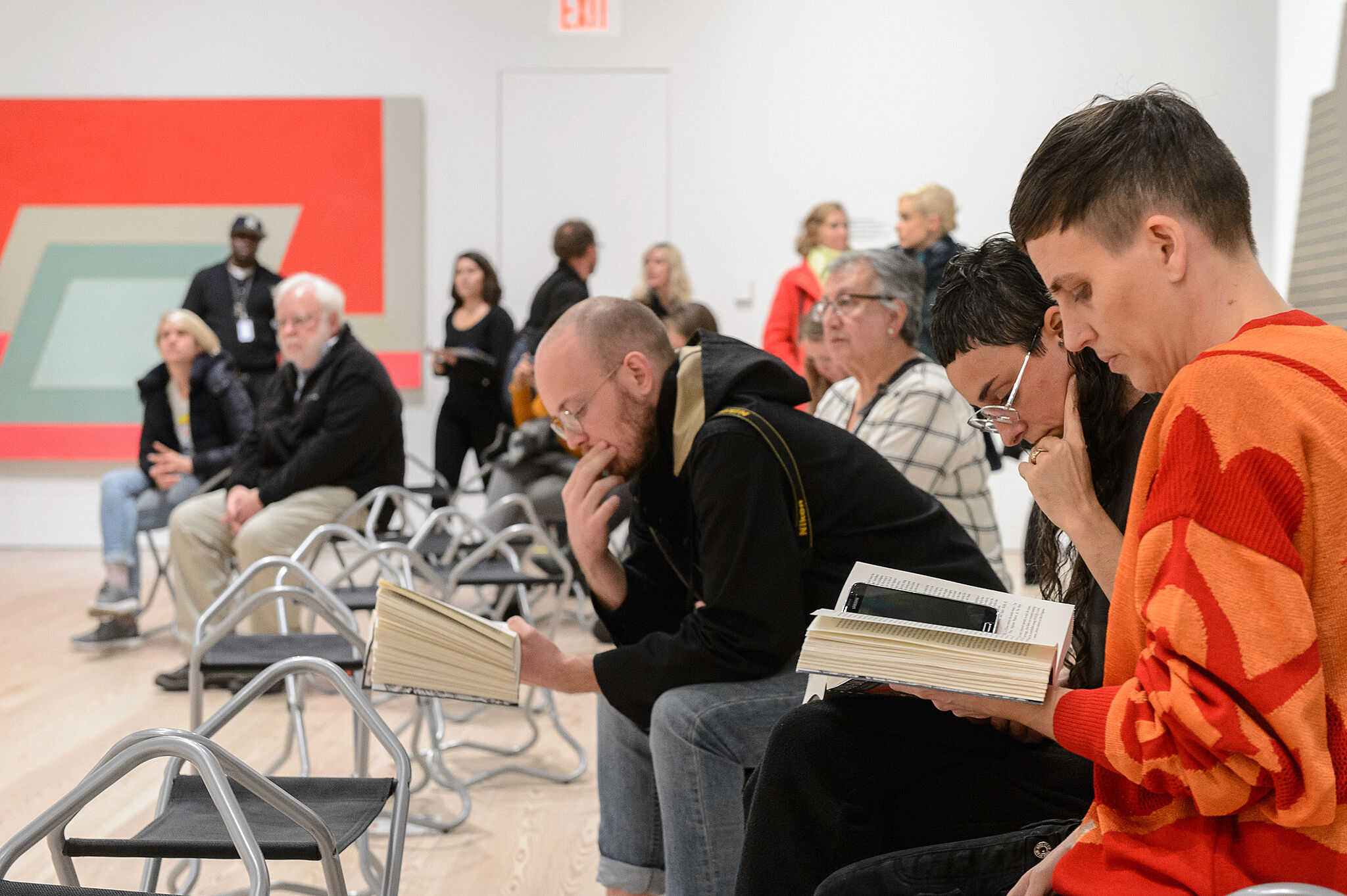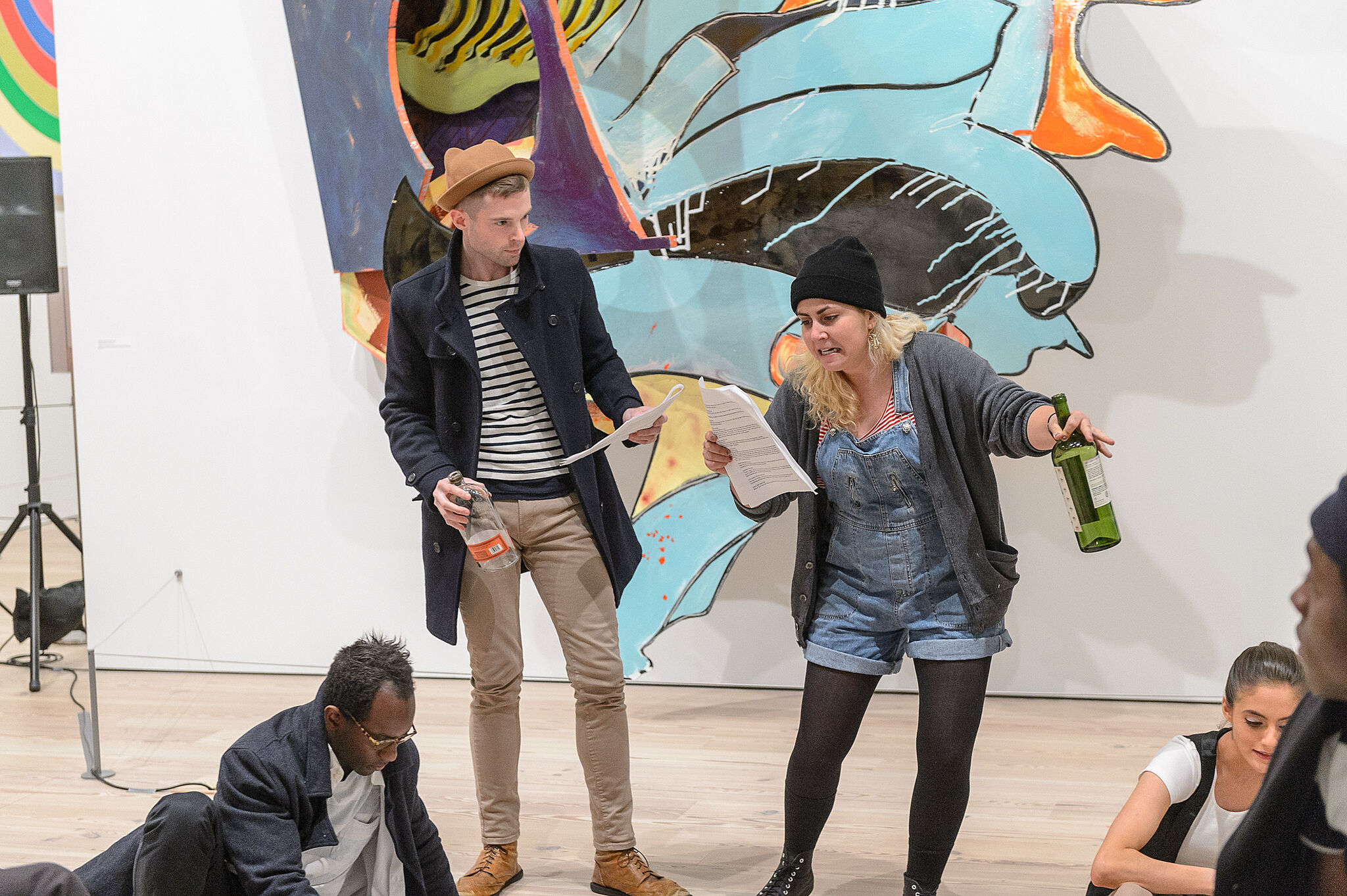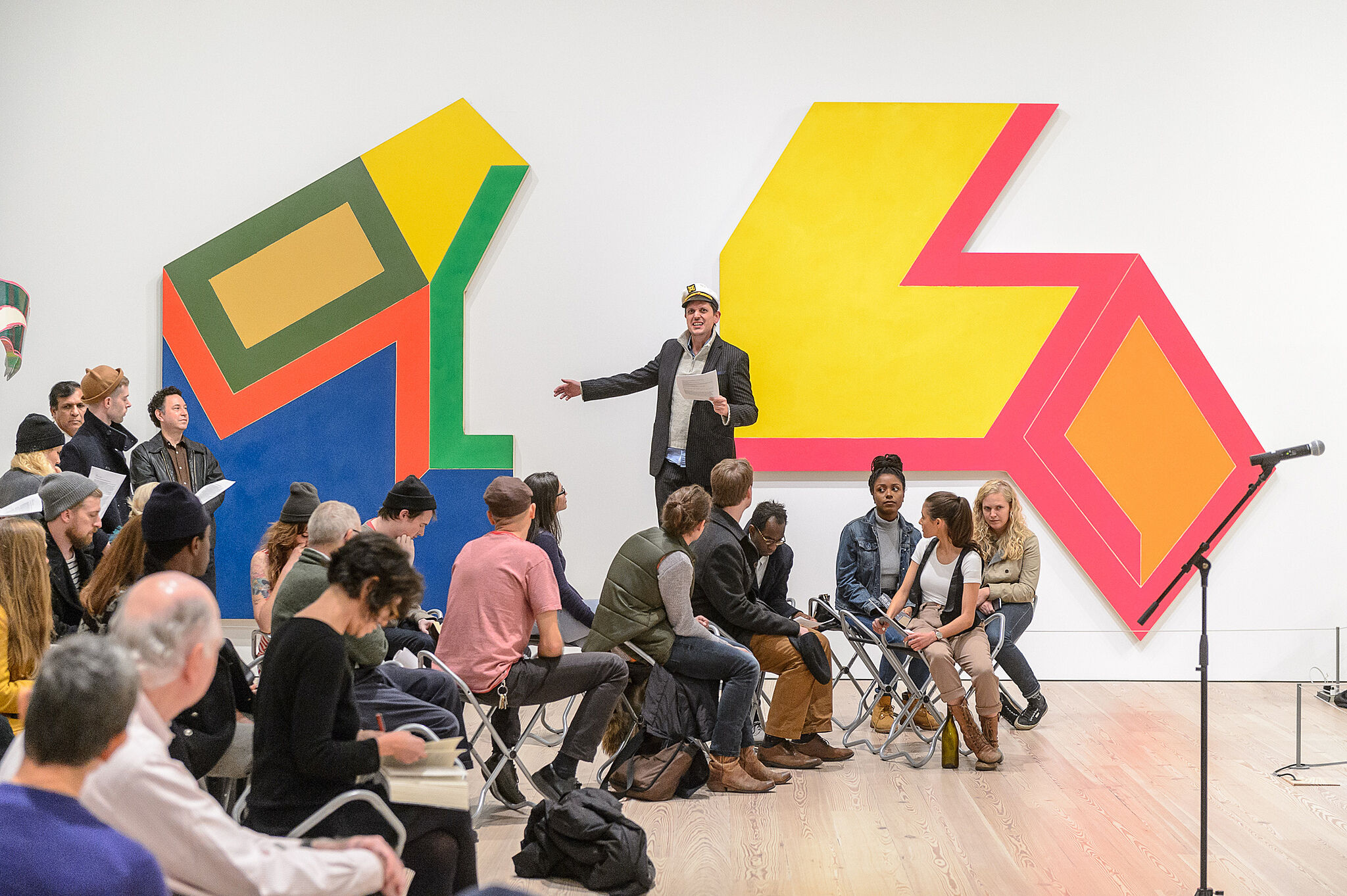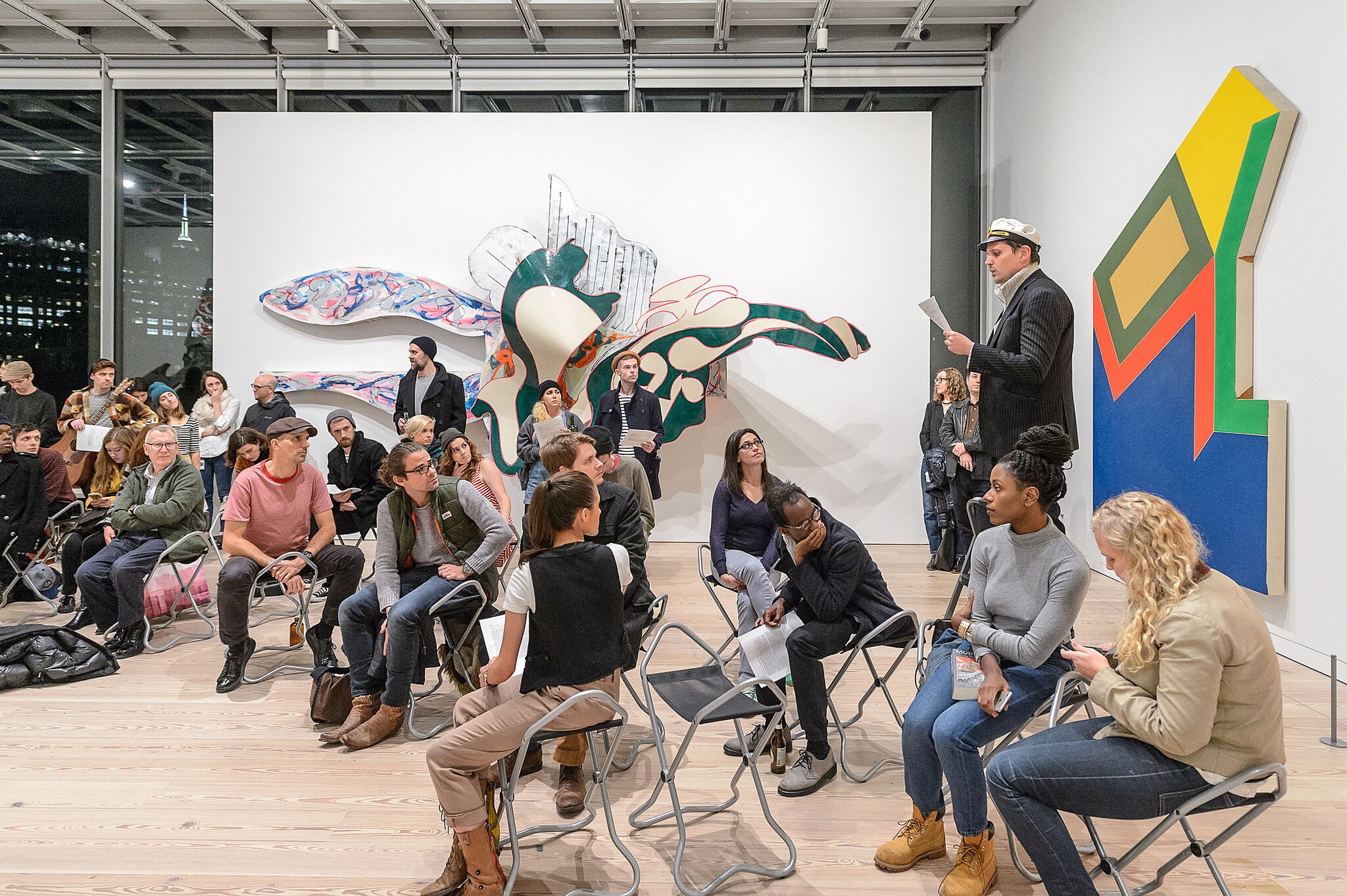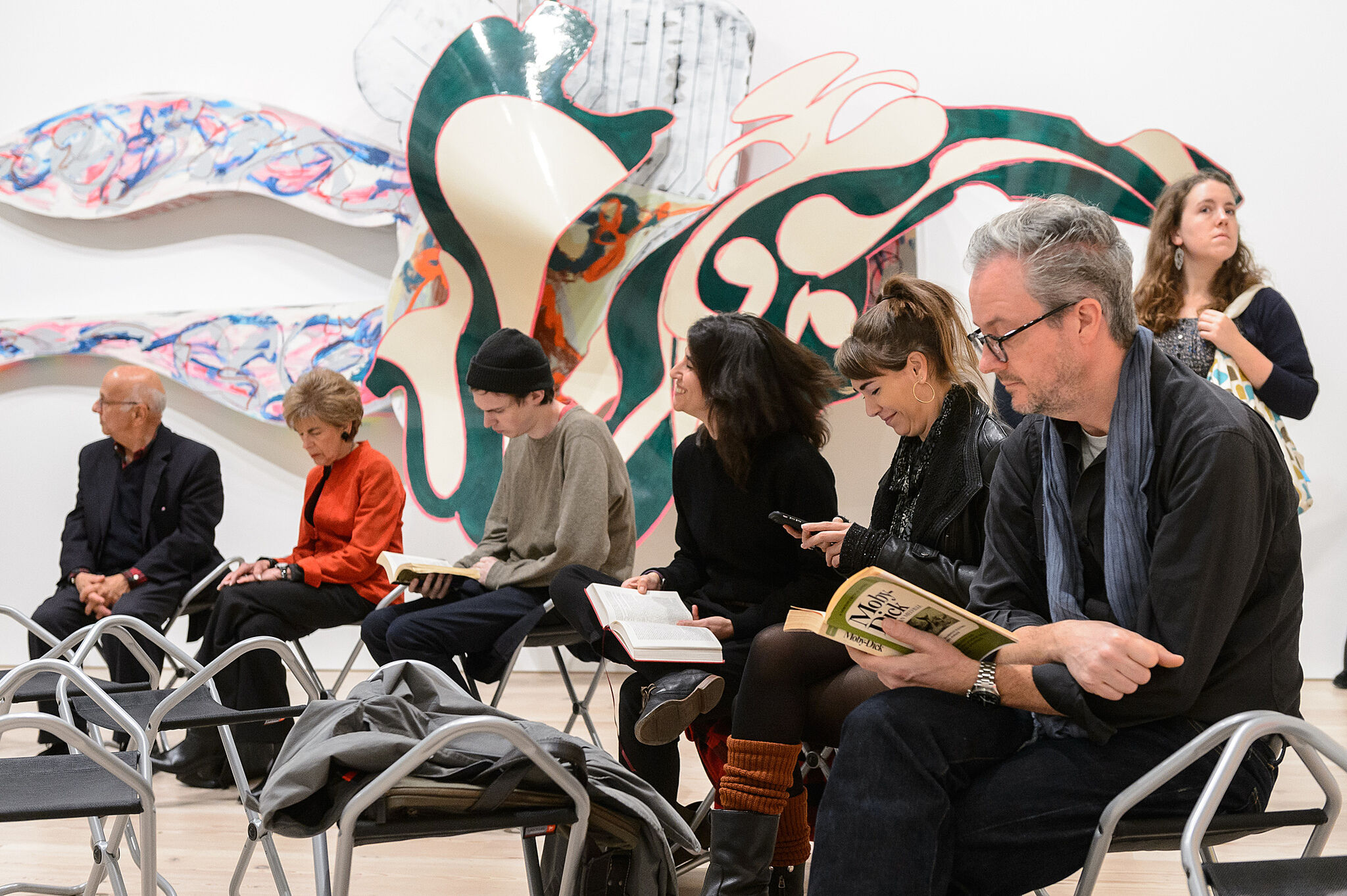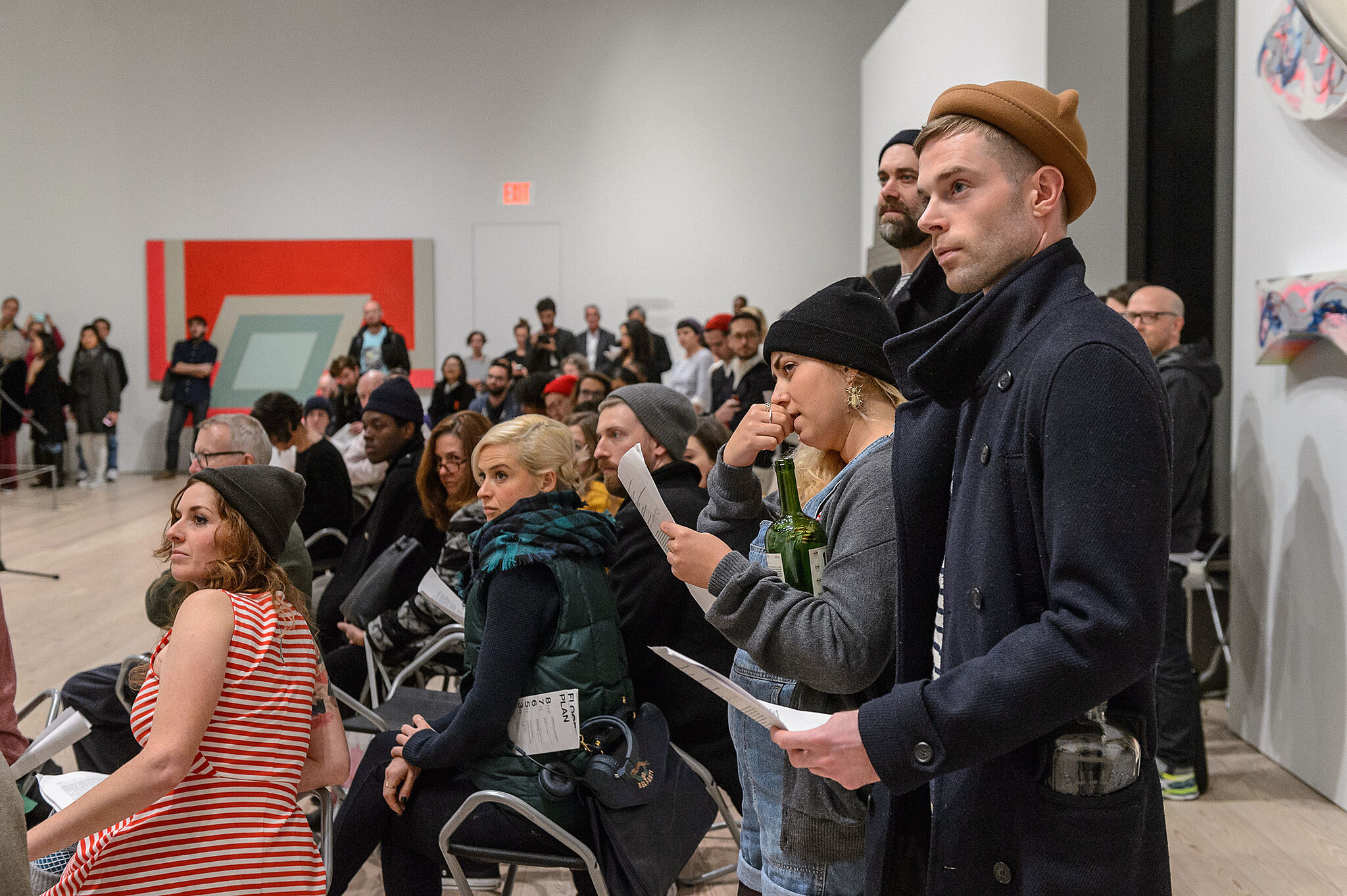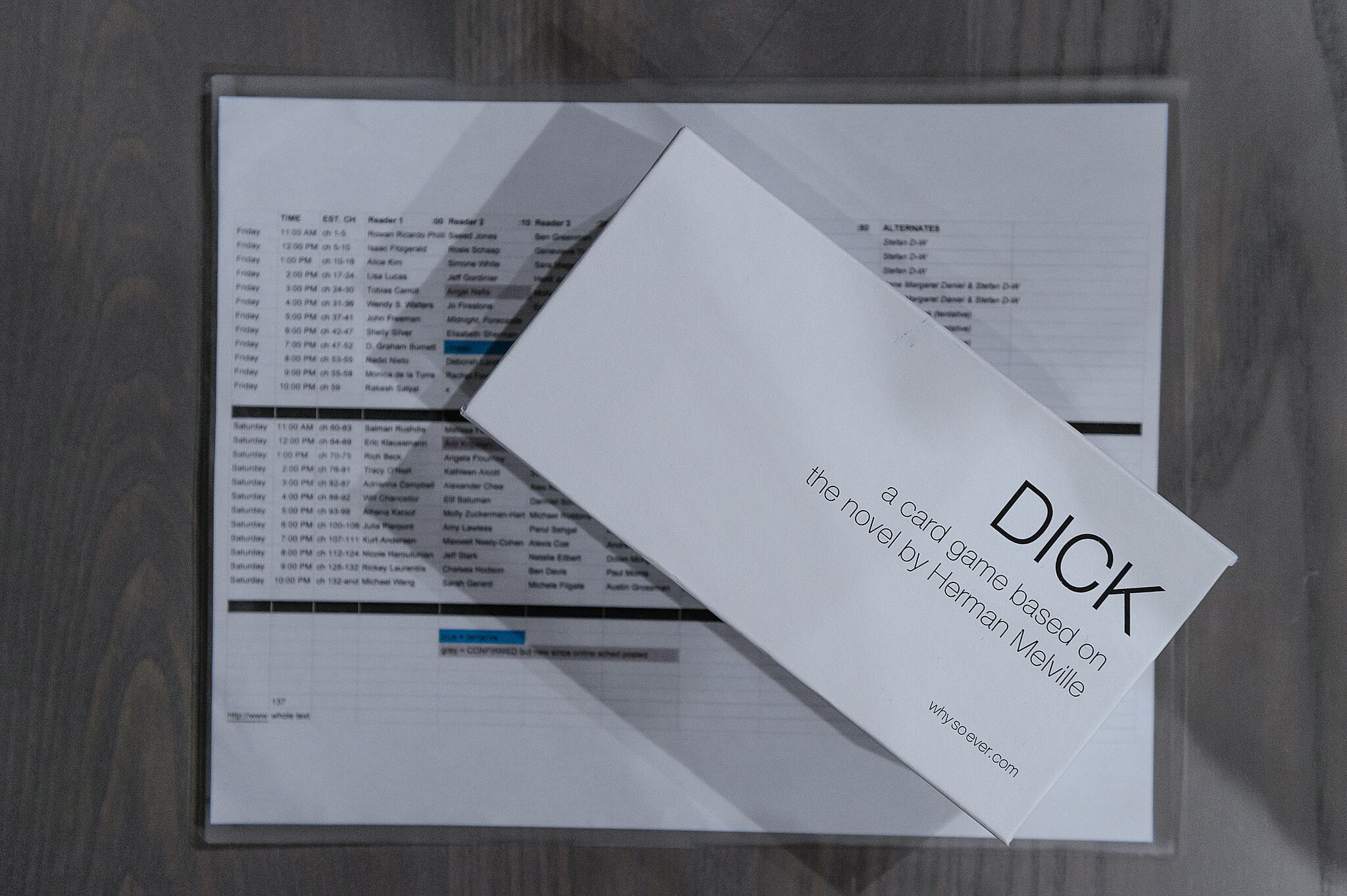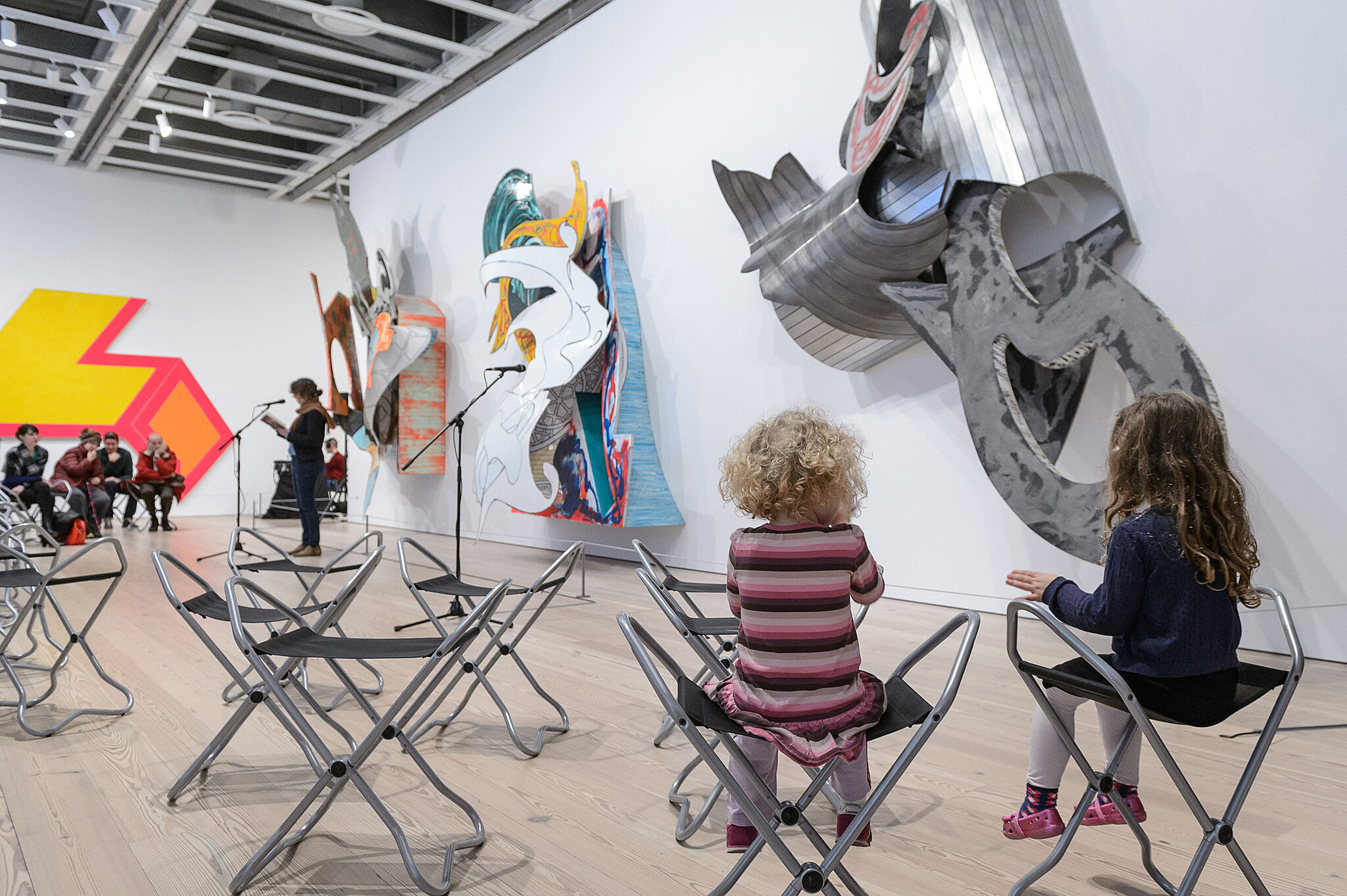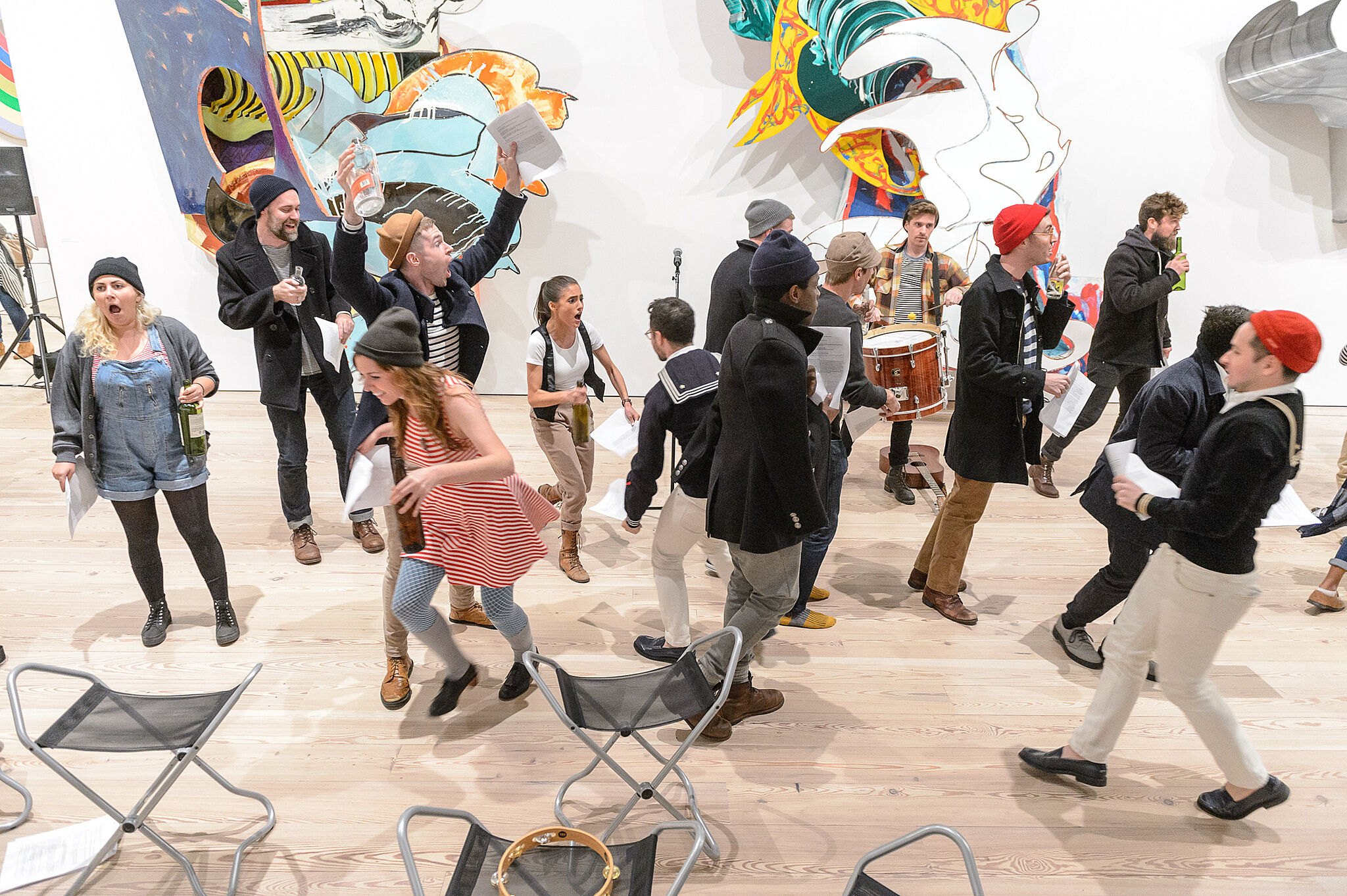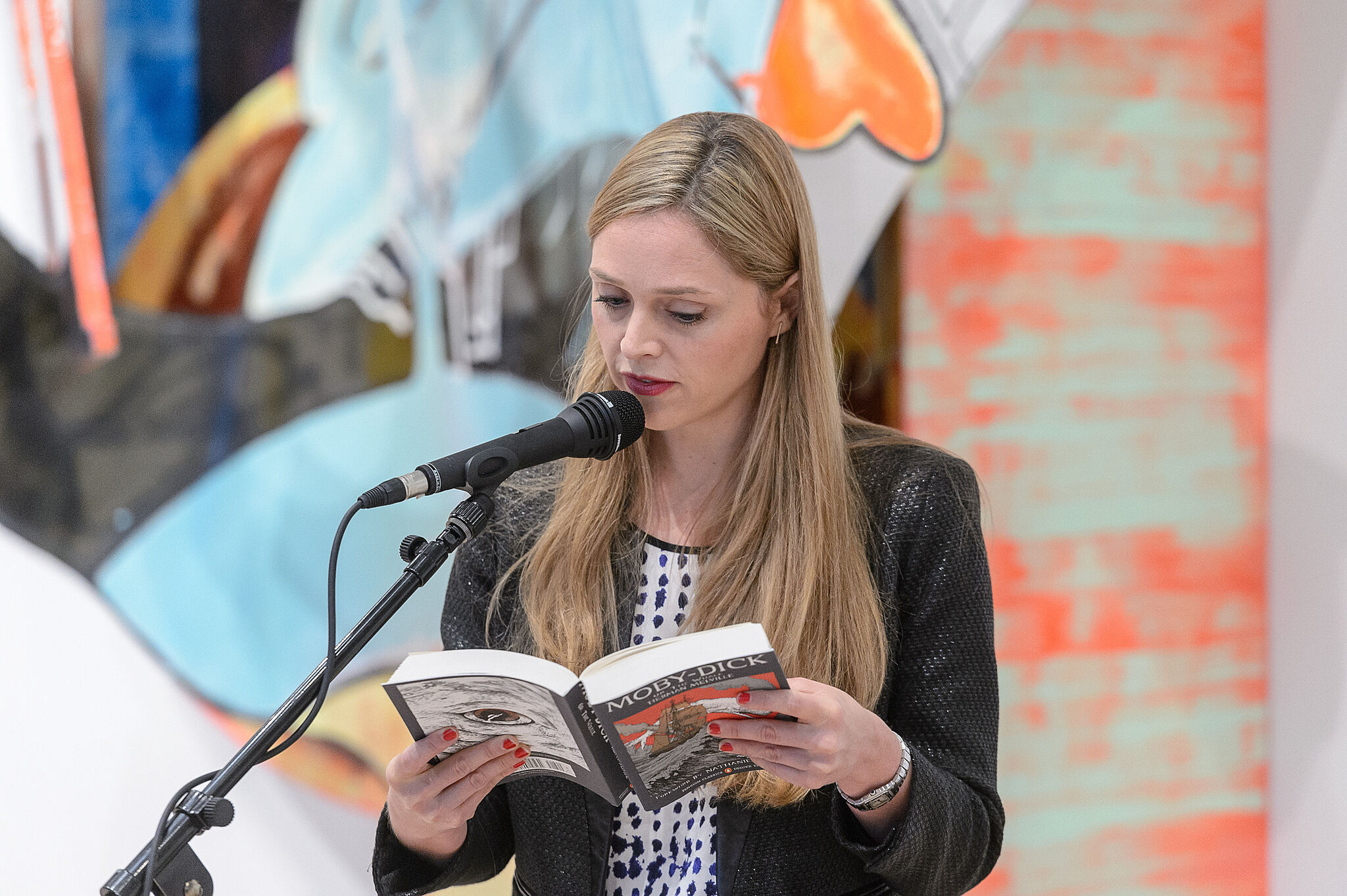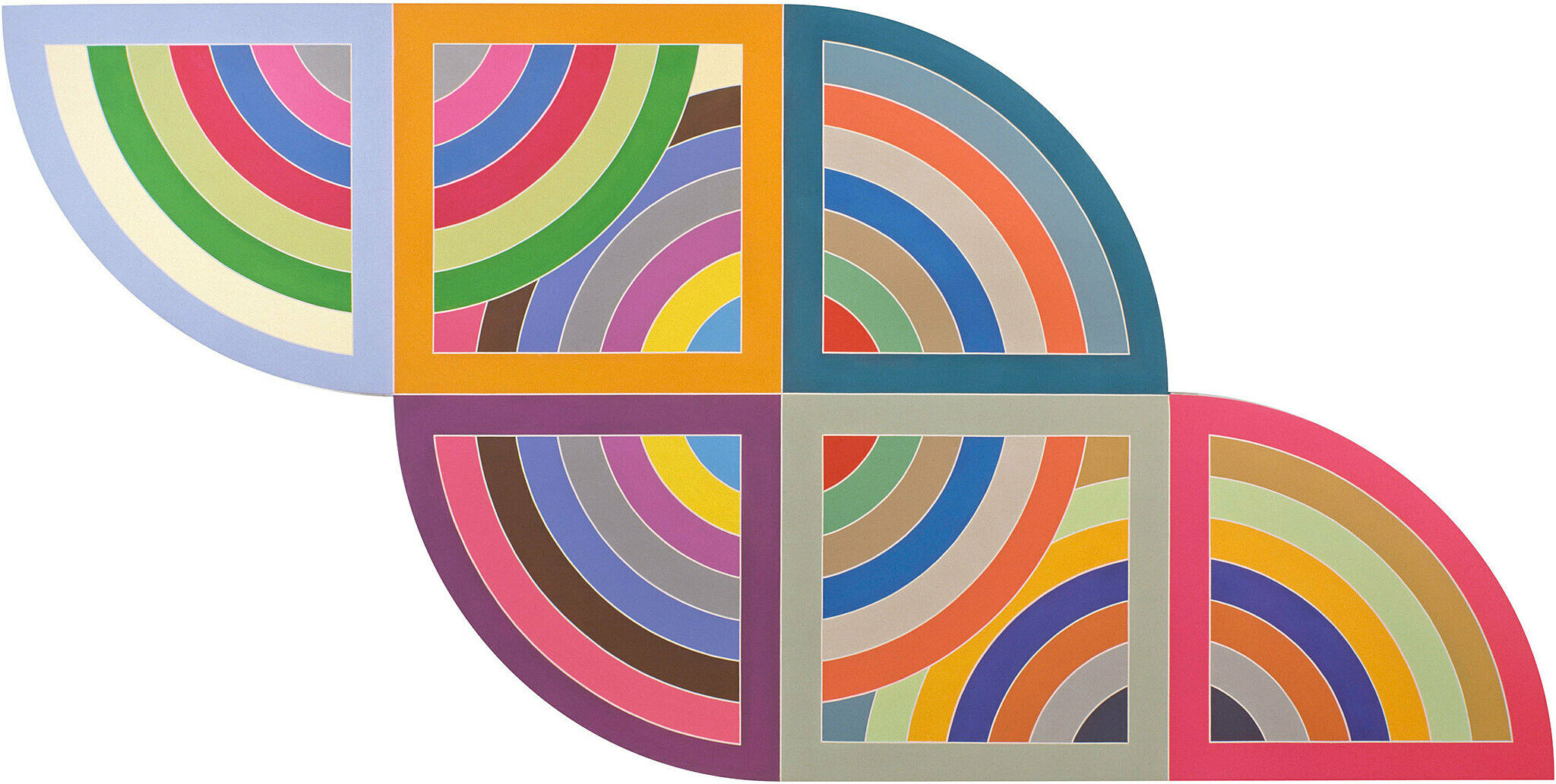What is Your White Whale?
Dec 2, 2015
In Herman Melville’s classic novel, Moby-Dick; or, The Whale, Captain Ahab spends his life (and the book’s many pages) seeking vengeance on the creature that destoyed his ship and took his leg. In the 164 years since its publication, the volume has served as a source of inspiration for countless artists including Frank Stella, whose retrospective is currently on view at the Museum. Meanwhile, the white whale has become an enduring symbol of any all-consuming, elusive pursuit.
On the occasion of a marathon reading that took place among paintings from Stella’s Moby-Dick series, artists and writers participating in the event responded to the question: “What is your white whale?” Below, read responses from Salman Rushdie, AK Burns, Sara Marcus, and more.
"My white whale is the quest for knowledge, the constant, unending stream of things to do, see, and learn that one can never really conquer in one’s lifetime."
—Elisabeth Sherman, assistant curator at the Whitney
"I would say gender. For me, for all of us. If we will ever, ever sail over it."
—Idra Novey, novelist, poet and translator
@IdraNovey
"Greater productivity is my white whale. I’m constantly fighting against my own indolence, wanting to do more, and never quite being able to get more done."
—Rosie Schaap, author and columnist
@rosieschaap
"My white whale is a perfect, loving silence. It’s the impossible thing to find, but it’s so worth searching for. It’s the beauty and terror of wanting to say something, but knowing that you don’t have to say something. Hearing everything around you—not hearing it, but wearing it like a warm blanket. We talk so much, we fill in so much space, and I would travel halfway around the world to find this perfect, loving silence, something that just encompasses you and understands you, and that you understand in turn. The more we live the way that we live, this is the great thing that we’re missing. Something that’s sublime, and natural, and awesome, and that we’re really terrified of. Or at least I’m a little terrified of it. For that reason I try to talk little, and listen a lot."
—Rowan Ricardo Phillips, poet
@RowanRicardo
“My white whale is the imagination. It is that thing that’s all-consuming. We all have it, and it can take control over us. It can be violent as much as it’s peaceful. It can create a new world as much as it can destroy it. It’s that thing that takes over me, and that I am driven by.”
—Rickey Laurentiis, poet
"For a writer, the white whale is the book that plagues you that you don’t know how to write. The thing you’re hunting is the next thing, which torments you, and which you are strapped to, like Ahab strapped to Moby Dick by harpoons. You drown together."
—Salman Rushdie, novelist and essayist
@SalmanRushdie
"Every writer, every artist, has a white whale that’s always in the room when they’re creating their work. It’s taunting them, and calling to them. For me, the white whale is sometimes doubt; sometimes it's fear; sometimes it's arrogance. When reading Moby-Dick, that is what Ishmael—and Herman Melville—are always in conversation with, this push and pull toward the end of creating art. Both have this arrogant desire to be the one who succeeds, and this heart-stopping fear of being the one who fails."
—Saeed Jones, editor and poet
@theferocity
"It has something to do with personal illumination, and the illumination of others. It’s like a path of permanent study, and a permanent state of sharing. Those kinds of things go hand-in-hand. It has something to do with being a teacher, and pursuing that, and also having an artistic practice. There’s kind of an obsession for me around that, a kind of engagement that’s constantly testing my own sense of what is, what I can do in the world, and what I put out—and what that offers other people. . . . There’s a certain selfishness in the sharing. It’s an obsession with my own kind of questions, and discourse, and evolution, and the idea that externalizing that somehow carries an effect that is useful to me, and useful to others. It’s a constant pursuit that I don’t think there is any end for, but it drives me.
It’s almost like just saying I’m an artist. I’m chasing my own tail. Being an artist is my obsession."
—AK Burns, artist
"I’m thinking through the term 'white' in Moby-Dick. The whiteness of the whale becomes the symbol of fear. It’s this fear that Ahab is deeply attracted to, obsessed with, and wants to conquer. In Chromophobia, David Batchelor contextualizes whiteness as an obliterating whiteness, which is basically how I understand it.
My white whale is the natural. It’s nature. It’s the idea that there are natural things. It makes me crazy. I’m obsessive about it when I speak, or even when I quote things. I don’t believe in nature, and I don’t believe in the natural."
—Halsey Rodman, artist
“There can only be one answer. I’m a novelist. The white whale is the next novel; it’s the next big question that I’m trying to answer that I’m going to generate 100,000–200,000 words towards, in attempt to capture, or subdue, or fill whatever impulses that are driving it. . . . It’s the novel I haven’t quite finished, or thought of yet. Novels are huge, and the pages are so white, and blank. It’s very whale-like to think of.”
—Austin Grossman, novelist and game designer
@Austin_Grossman
"I could say that my white whale is the state the country and world are in, but that’s incredibly vague. But maybe that stands in for Moby-Dick being seen on all continents, all at once. To be precise, I would limit it to the United States—the state of civic society at the current moment, and what to do about it."
—Shelly Silver, artist and associate professor
"My white whale is the Jets finally winning the Super Bowl. Unlikely to happen in my lifetime."
—Eric Klaussman, Herman Melville's great-great-great grandson
"My white whale is the English language."
—A.O. Scott, journalist and film critic
@aoscott
"I think I’ve had a series of white whales, and I’m pretty sure I’ve either conquered, or abandoned the quest to conquer, all of them. I have no white whale anymore; I’m just free on the open sea."
—Melissa Febos, author and essayist
@melissafebos
"I started reading Moby-Dick when I was in the middle of writing my first book, Girls to the Front: The True Story of the Riot Grrrl Revolution. I had to stop reading Moby-Dick, because I was too tempted to completely rip apart the book I had written, and rewrite it as Moby-Dick. I avoided that temptation, while at the same time really taking a lesson from how the vast overbearingness of the one aim is precisely what gives Melville so much liberty to go everywhere else in the book. You never feel lost because you always know what the great desire is. And weirdly that very thing, that very tension between keeping your eye on the overarching desire, and countenancing these limitless digressions, is in fact my white whale. My whole career as a writer, and my whole life as a thinker, I’ve been trying to sail that line between the linear and the digressive, between the single, unifying idea and the plural ideas, and how they don’t get absorbed into each other, but just crackle up against each other, repeatedly."
—Sara Marcus, essayist, critic and editor
@thesaramarcus
"It’s the constant pursuit to find meaning in life, and do the right thing."
—Paul Bresnick, literary agent, publisher and editor
“My white whale is attempting to write or make art, and simultaneously live an ethical life that is situated in a context of a world where making art may not be the most ethical use of one’s time.”
—Mike Lala, poet
@mike_lala
"I think I’m my own white whale."
—Jo Firestone, comedian
@kingfirestorm
"My white whale is finding both a place where I want to be, and where I belong. Kind of like Ahab, I have a hard time letting go of that quest for perfection of place. Realizing that where I am now, and where I am going to be, is usually where I need to be, and where I’m happy to be."
—Isaac Fitzgerald, editor and author
@IsaacFitzgerald
"As I take it, a white whale is that which you pursue obsessively until it consumes you entirely. This might be a bit of an elliptical answer, but I think the space of my own dreaming constitutes what a white whale would be. It’s a space of surrendering to something every night, and having no certainty whether what I’m experiencing is real or not. Sometimes I tell myself it’s not real, and it’s rather futile. It always feels like there’s no certainty in coming out of [the dream], and that is something that happens every night."
—Genevieve Yue, assistant professor, editor and author
@genevieveyue
“My white whale is my father’s ego. It is not my father specifically, in human form, but the mystery of him. It is the image of him that I created as a child that speaks to me, both encouragingly and discouragingly, both praising and condemning. It is the way in my voice that is always present when I’m writing, and when I’m doing anything I am invested in. The voice that I am always trying to tame, but of course if I ever were to tame it, like Ahab, I would have little reason to drive on. I’m both pursuing and backing off at the same time. It’s a necessary haunting. It’s neither uplifting nor demeaning. It gives meaning to life. I think of a similar narrative, a great American story, Star Wars. I believe Vader says to Luke, 'who gives your life meaning but me?' The necessary evil of the white whale, and the chasing of it, is something I realize is a necessary and defining characteristic.”
—Gregory Pardlo, poet
@Pardlo
“My white whale is my next book, which is very hard to write. I’m going from writing a memoir to writing a novel; it’s a completely different animal I’m trying to harness, and not murder, but do something good with.”
—Jen Doll, author
@thisisjendoll
“My white whale is my own blubber, which I have never been able to master or subdue. I am my own white whale.”
—Mary Norris, author and copy editor
@MaryNorrisTNY
“I have a series that I’ve been working on for many years, where I take photographs of identical twins in airports. So I’m always hunting identical twins when I’m in airports.”
—Matthea Harvey, poet and children's book author
"My white whale is my anxiety. It’s by no means anything that I can chase down, the way Ahab and his crew chase down Moby Dick. But it is something that just feels ambiently there, often a dark shadow around my existence. I don’t know if I’ve conquered it. There’s also a part of me that feels like my anxiety is something of a companion, even though it totally stresses me out, and is something that I try to conquer with as much fervor as Ahab does with his own white whale."
—Doreen St. Felix, writer and artist
@dstfelix
“My white whale is a sense of balance. I mean balance in the way of kindness to others, job, family, being a good wife, being a good daughter, giving enough time to other people, being an empathic success, while also having enough space for myself, taking up enough space, while not infringing on the space of others. Many times I feel like life can be a picnic blanket, and every time you have three of the corners battened down by a shoe or a weight or something, the fourth one comes undone. I’m forever trying to balance the picnic blanket.”
—Marie-Helene Bertino, novelist and short fiction writer
@mhbertino
"My white whale is myself, or the image I had of myself when I was younger. You imagine what kind of adult you’re going to become, and though that shape has shifted year by year, as I get older and more mature, I want different things, and don’t want to be a ballerina. That idea of just being grown, and kind, and classy, and bossy, and in charge of my life, and proud of myself. . . . There’s no catching up with yourself; you’re always sort of becoming your adult self. I don’t know if I’m an adult yet. Twenty-six—still working on it. You always want more. More experiences, more achievements, and more things to gather to yourself: this is what I’m up to, this is who I am, this is what I’m contributing to the world, this is my engagement to beauty, and all these things."
—Angel Nafis, poet
@AngelNafis
“My white whale is finding the way that I want to write stories, tell stories, tell history about the music that I love. I’ve been a music journalist, I’ve edited many magazines, I’ve written stories, I’ve written books. It feels like every few years, I change up the format, or the medium, or the way that I tell those stories. I'm constantly trying to catch up with the way that I’m not even aware of yet, the next way to try to do this work. It’s certainly a lifelong obsession, much like the pursuit of the whale is. It drives me crazy, and keeps me up at night, much like it does for Ahab. It’s not torture and torment. I’m not somebody who is agonized by my writing, but I do see that I have to continually adjust, and adapt, and reconfigure, and move forward to figure out how to do my work. That will be the thing that I am chasing for as long as I chase.”
—Alan Light, journalist
“It’s being good to other people. I don’t think you can ever be good enough to somebody else. . . . I’m always trying to be more kind. So kindness, in that sense, is my white whale.”
—Ted Dodson, poet and translator
@tedodson
"I’d like to someday live near the water again. It’s kind of a funny response because here I am in Manhattan, and we’re surrounded by water, but I really don’t feel like I’m part of a beach culture here. I would like to live in a place again where wildlife, and especially marine creatures, are an essential part of the culture. . . . I’ve always felt rather connected to [Moby-Dick's] landscape. . . . It’s a pretty important part of my life as an author."
—Sarah Gerard, author and novelist
@SarahNumber4
"I try to live without a white whale, but living in New York, my white whale would be owning an apartment, or, in lieu of that, just having a backyard would be good enough. I’ll aim low—I don’t want to end up like this dude we’re reading about right now. It sounds like a bad fate, so I try to avoid it."
—Camille Rankine, poet
@camillerankine
"Finding the ideal work-life balance. I have an almost-one-year-old, and a full time job. Finding as much time as I would like to be with my family, and as much time as I would like to do my job, and my work, is basically impossible. If there was any way that I could reconcile my personal life and my work life, that would be incredible. It would be amazing."
—Claire Barliant, critic and curator
@claire_barliant
"My white whale would be art, and literature, and inspiration, and their relation to each other. It’s been my white whale since I first decided I wanted to be a writer at age four, and probably will be until the day I die."
—Porochista Khakpour, novelist
@PKhakpour
"In the piece I read, Ahab was talking about how he widowed his wife the moment he married her. Not having ever been married myself, I like to think that my white whale is the woman I’ve yet to meet, and the woman that I’ve been chasing and haven’t met yet."
—Paul Morris, author and Director of Literary Programs at PEN American Center
"My white whale is whatever book I am working on at that time. I like to read Melville that way. Even as he’s talking about Ahab and Moby Dick, he’s also talking about this monstrous book that he’s working through, and how you finally either put a harpoon in it, or it drags you down into the ocean. Often, ideally, it’s both. I think being here in the Museum is a little strange, because when you’re a prose writer, like I am, things always come one after the other. When you come to a Museum, and you see things that are curated and hung on the walls, you tend to make up an order as if you’re moving towards some conclusion, when really you’re just looking at individual works, one after another, and you’re inventing that narrative. I like to think about that when I’m writing. I like going to Museums because it reminds me that I can write two or three pages, and that’s a thing. I can be done there—that’s a work. I don’t have to worry that day about fitting it into the three-hundred-page thing. So my white whale is, you know, stupid books, and all of the pressure that they create in my head."
—Ben Greenman, author and journalist
@bengreenman
"My white whale is the present tense. It’s the thing you’re always trying to get to by being inside of an experience, or completely inside of it, if it exists or not. The attempt for it creates a lot of action, which becomes itself again."
—Trisha Baga, artist
"My taxes."
—Lisa Lucas, publisher of Guernica Magazine
@likaluca
"My white whale is finishing the book Moby-Dick, which I’ve been reading on and off for probably twenty years, and I keep stopping. I just really want to finish it one day."
—Sara Magenheimer, artist
@saramagenheimer
“My white whale is surviving day by day in New York City, that battle to make ends meet without giving in to the needs of money. We all seek a fulfilling life, we want to do better by ourselves, and by our children, and by our families. Life can’t just be paying the rent. You want to live in a creative city, you want to be fulfilled, you want to be creative, you want to contribute to the energy. I feel like chasing that in a positive way has been my whale up until now.”
—Cynthia Tobar, oral historian, archivist and metadata specialist
@latona12
"My white whale is my art. We’re all chasing whatever note of genius there is. It's art, and it’s always ahead of me, and I don’t know where it is all the time."
—Natalie Eilbert, poet and editor
@natalie_eilbert
"My white whale is whatever project is in front of me. I have organized my life and work around a series of projects, and in this way I can avoid Ahab’s downfall, which is that he has one white whale. I think if I have a bunch of smaller white fish, I kind of avoid going crazy."
—Jeff Stark, artist and editor
@jeffstarked
"Currently, my white whale is an elusive second novel."
—Paul Rome, novelist
@paulmrome
"For me, the white whale is always the creative work, the project that seems a little bit out of my reach. Sometimes that’s literature—writing something for me—but sometimes it’s producing other people’s work, and facilitating conversations among other artists. That’s the kind of thing that I feel like I pursue to the point of catastrophe."
—Wendy S. Walters, poet, essayist and author
"My white whale is definitely the pursuit of men in general. It’s really hard to date in New York City, and the pursuit of men is something that just continually breaks me. I’m kind of convinced that it can’t really happen here. I’m willing to be proven wrong, but I do feel like more often than not, I end up floundering."
—Tommy Pico, poet and editor
@heyteebs
"My white whale, as a writer, is the perfect story. When I meet someone I want to write about, or create a portrait of, something clicks in me, and there’s this feeling of really wanting to try to capture something about that person that even they don’t see. It’s such an imperfect process, and I don’t think there’s any way to ever get it completely right."
—Alex Mar, author and documentary filmmaker
@_alex_mar
"Isn’t everyone’s white whale money? Isn’t that it? How much horror, and giantism, and whiteness . . ."
—Simone White, poet
"Since I’m a writer, my white whale is to somehow, someday, put into words, like actual written words, exactly what I mean in my mind and in my heart. The translation never seems quite accurate or right, and I’m always fighting to get it perfect."
—Alice Kim, fiction writer
@alicek
"My white whale might be achieving some perfect motherhood. I just had a baby about a year ago, so I’m thinking a lot about chasing this good-mother standard that I’m not sure exactly exists."
—Polly Duff Kertis, poet and co-founder of Moby-Dick Marathon NYC
"My white whale is the search for feeling like you have some agency in the world, that the space inside of your brain comes out into a world that matches with what you intended. I’m constantly seeking to bring the inside of my brain and the outside world closer together; there’s always a big gap between the two of them. I probably won’t ever find that that’s going to be true because there’s an actual physical thing between the inside of my head and the outside of it. So, they’ll probably never come together, but that’s fine."
—Dolan Morgan, fiction writer, poet and editor
@dolanmorgan
"It’s probably happiness. I've found glimpses of it along the way, but this idea of trying to be fulfilled and happy in some way may be nonexistent. I’ve always tried to work out how I can build my life towards that calm place. Work stuff—writing and interviewing—gives me these moments of great connection, and I sometimes wonder if that’s what happiness is. I think about love, and how you can keep chasing and chasing love, and whether maybe you just have these little moments, it’s not this great, huge, end goal. . . . I think my white whale is a combination of all of those things. Giving up on some perfect result."
—Angela Ledgerwood, author and editor
@AngelaLedgerwoo

